
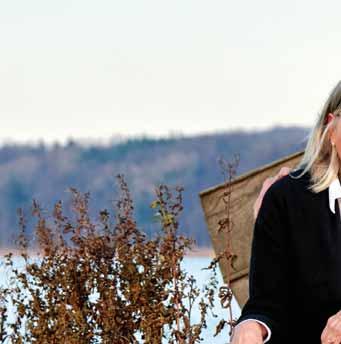




Meet the new RI president, Holger Knaack, and his wife, Susanne.









Meet the new RI president, Holger Knaack, and his wife, Susanne.


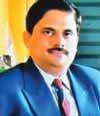
DG Sangram Vishnu Patil
RI District 3170
Secretary - Executive Committee


DG Sanjiv Rai Mehra
RI District 3011
Chair - Governors Council

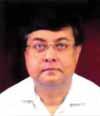
DG Sudip Mukherjee
RI District 3291
Secretary - Governors Council


DG Prashant Jani
RI District 3060
Treasurer - Executive Committee


DG S Muthupalaniappan
RI District 3232
Member - Advisory Committee

10 Young at heart
Get to know your new RI President Holger Knaack.
22 The world needs our optimism, leadership, compassion: Mark Maloney
RI President addresses Rotary’s first ever virtual convention.
25 New Area of Focus
Supporting the environment becomes Rotary’s seventh Area of Focus.
30 Sir Clem was a gift to generations of Rotarians
PRIP Rajendra Saboo recalls PRIP Clem Renouf ‘s sterling contribution to Rotary’s polio eradication drive.
45 Rotary India loses an educator par excellence
PRID Ashok Mahajan fondly recalls his association with PRID P C Thomas.
48 RC Chandigarh does exemplary work during pandemic
Chandigarh’s Rotarians provided relief to railway porters and others during pandemic.
50 Rotarians boost income through goat rearing in Oholi, Maharashtra
A four-year long project of RC Wai brings holistic development to a remote village.
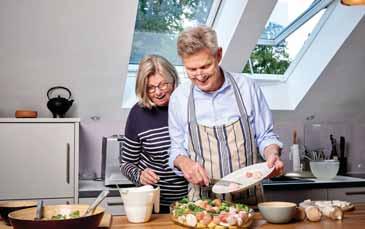
10


52 Egypt… an awe-inspiring civilisation
Explore the wonders of this Mediterranean country known for its pyramids, mummies and the River Nile.

On the cover: RI President Holger Knaack and his wife Susanne at their hometown Ratzeburg, Germany. Photo: Samuel Zuder.
48 50 52 30 45
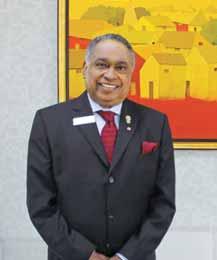
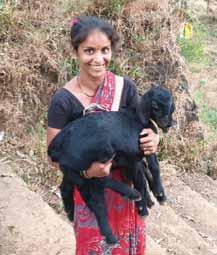

Thearticle by PRIP Kalyan Banerjee, , was truly inspirational. For youngsters, it is important to adhere to the basic principles of Rotary to imbibe its true spirit. To know the grandness, yet cordial character of PRIP Frank Devlyn, who was a true model for all Rotarians in doing service, is exhilarating. Philanthropy is a great virtue by which social inequalities can be brought down and the world needs more women in the forefront to share their qualities. Hope the life of Devlyn serves as a beacon of humility and compassion for all Rotarians. I expect more such inspirational

articles on Rotary leaders.
It is a great example of leading from the front as RI President Mark Maloney himself participated in the VTT medical mission to Zimbabwe (May issue). It is heartening to note that Rotary India has carried out this true humanitarian service. As a dental surgeon, I feel proud to know that multiple procedures were done by PDG Dr G K Thakral and Dr Rashmi Thakral.
Kudos to RC Mumbai
Queen’s Necklace
The May issue contains many reports on Covid-related activities by Rotarians in India and we can be proud of these. Thanks for the wide coverage of the relief work done by Rotarians during this pandemic, even during the lockdown. I extend my good wishes to the virtual convention. The Editor’s note on the Covid warriors during the pandemic and the positive effects of the lockdown on nature are interesting to read. A single Rotary club in
The gesture of PRIP Rajendra Saboo and RC Chandigarh in sponsoring congenital heart surgeries for children from Zimbabwe reaffirms the role of Rotary in being a glorious ambassador of peace and prosperity for millions of needy people.
Ienjoyed reading the articles written by PRIPs Kalyan Banerjee and Rajendra Saboo as well as the editorial paying rich tributes to the late PRIP Frank Devlyn. I had sent to the Editor a 500-word tribute to Devlyn, and pat came the response — in exactly seven minutes — regretting her inability to publish it. As I was my club president in 2000–01
Mumbai — Rotary Club of Mumbai
Queen’s Necklace — collecting `11 crore to feed Mumbai’s hungry is praiseworthy. Also, I was delighted to read the noble deeds of Mark Balla for WinS in India.
Glad to know the team led by Rajendra Saboo was able to complete 500 major surgeries in Zimbabwe. All the photos and writeups are nice. The editorial team is to be appreciated for their sustained efforts.
and had worked in the area of avoidable blindness for many years under the leadership of PRIP Devlyn, I was a little disappointed. However, on reading the three excellent write-ups, two by our PRIPs Saboo and Banerjee, and the editorial, recalling his greatness and contribution to the Rotary world, I could understand why I received that super fast response!
Let me recall here that I had sent my wishes by email to Devlyn on his 75th birthday and after some time, he responded through a mail stating, “Every now and then, I like to reminisce by re-reading a few special letters brought together in a personalised memory
that many clubs in our country provide food to needy during the lockdown. But it is really great to see that RC Mumbai Queen’s Necklace distributed nearly 1.6 lakh meals per day for more than 40 days of lockdown from March 24. It is both surprising and heartening to know that the club raised nearly `11 crore for this noble cause from their own businesses, partners and well-wishers.
Philip Mulappone M T RC Trivandrum Suburban
— D 3211
Even though it is a herculean task to prepare 1.6 lakh meals per day, the club partnered with Iskcon, TajSATS flight kitchen and several
book that was given to me as a gift by my wife and daughters. These birthday messages and letters remind me of how much persons such as yourself value my friendship.” These touching words show his simplicity and friendship which have been wellhighlighted in both the articles and the editorial in the June issue.
IhaveKamalamma with her positivity and optimism reaffirms that there is pleasure in giving. You have enhanced your image by highlighting her generosity.
others to prepare this huge volume of food, and despite logistic difficulties, managed to get more than 200 volunteers for the supply of meals to the migrant labourers, daily wage workers and other marginalised sections of society. Hats off to the wonderful service rendered by this club. Congrats to president Sonal and her team.
N Jagatheesan
RC Eluru — D 3020
Congratulations to RC Mumbai Queen’s Necklace for the
Nothing to beat the pleasure of reading printed magazine
received the e-magazine and hope I will receive the hard copy too. While savings are possible in bringing out an e-magazine, there is nothing like holding a copy in hand, still fresh with the smell of print, flipping through the pages, pausing at the interesting ones, looking at the pictures of people we know personally, reading the stories associated with them, slowly digesting what we read, and sharing the content immediately with our members and family through WhatsApp.
I always keep beside the cash table in my store, pick it up and read whenever I find a few free minutes. Sometimes I show the magazine to our customers and share with them what Rotary is doing around the world. My father, who is a Lion, reads the whole magazine and points out to me what I might have missed out. Yes, the e-version has its own advantages, but nothing can equal the pleasure of reading a printed version.
Yes, you will indeed receive a printed copy! — Editor.
amazing project of delivering food to needy. Secondly, kudos to the photographer who took the cover picture. The happiness on the child’s face speaks volumes about the goodness in this world . Finally, thanks for selecting this photo for the cover page. Keep up the good work.
Brij Khandelwal
RC Madras Central — D 3232
Excellent work by RC Mumbai Queen’s Necklace in providing food to the needy. Salute to the club and its project team.
Kiran Oza
RC Bhavnagar (Main) — D 3060
In the article Zimbabwe medical mission does 500 surgeries , PRIP Rajendra Saboo recalls, “After Sam (Owari) died, (the then) President Barry Rassin said to me, ‘Raja, let us see if we can fulfil the dream that Sam had.’” I thank PRIP Saboo for keeping that dream going.
This was definitely a model project of Rotary whose ideal is to serve humanity. Medical services further add to its depth. I congratulate Saboo and his team for going to a farawayland for doing such great service. Thanks Rotary News for highlighting this medical mission to motivate all of us.
Dr Sanjay Aggarwal — D 3080
We welcome your feedback. Write to the Editor: rotarynews@rosaonline.org; rushbhagat@gmail.com Click on Rotary News Plus in our website www.rotarynewsonline.org to read about more Rotary projects.
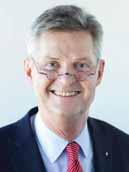
Dear Rotarians, Rotaractors, and friends,
This does not seem like a time for great optimism, but it has to be. Long before Rotary was founded, the world dealt with great crises that tested humankind’s ability to progress and endure. In the age of Rotary, the world has faced many more catastrophes; however, we have survived, and every step of the way, Rotary has helped the world heal.
Every great challenge is an opportunity for renewal and growth. I revealed the theme of Rotary Opens Opportunities at the International Assembly in San Diego just as the Covid-19 crisis was beginning, but these are words that I have believed for many years.
Rotary is not just a club that you join; it is an invitation to endless opportunities. We believe in creating opportunities for others and for ourselves. We believe that our acts of service, large and small, generate opportunities for people who need our help, and that Rotary opens opportunities for us to live a richer, more meaningful life, with friends around the world, based on our core values.
Governments and institutions are gaining a greater appreciation for the types of public health partnerships that are critical to our work. People stuck at home, eager for greater connections and hungry to help their communities, are now embracing the values we have promoted since our beginning.
All of this is positive news, but just because there are greater opportunities than ever for Rotary to thrive
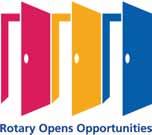
does not guarantee that we will succeed. The world is changing rapidly — and was doing so even before this crisis. People were starting to move away from regular lunch meetings and toward online gatherings. Friendships were being cultivated and revived in social media relationships even before most of our meetings moved to Zoom and Skype. Younger generations have a strong desire to serve — but have questioned whether they could play a meaningful role in organisations like Rotary or whether they might make a bigger impact forming different types of connections. Now is the time to put everything on the table, test new approaches, and prepare Rotary for the future.
The Covid-19 crisis has forced all of us to adapt. This is good, and our new Action Plan specifically calls on us to improve our ability to adapt. But adaptation is not enough. We need to change, and change dramatically, if we are to face the challenges of this new age and provide the Rotary that the world so desperately needs. This is our great challenge, not just in the next year but into the future. It is up to us to remake Rotary for these new times — to wholeheartedly embrace the ideas, energy, and commitment of young people eager to find an outlet for idealism. We must become an organisation fully enmeshed in the digital age, not one that simply looks for online ways to keep doing what we have always done.
The world needs Rotary now more than ever. It is up to us to make sure that Rotary Opens Opportunities for generations to come.
Holger Knaack President, Rotary International

fter joining the Rotary News Trust as Editor over five years ago, I have covered from ground zero only three conventions — at Seoul, Atlanta and Hamburg — and enjoyed the colour, vibrations, energy, passion, vigour, an eclectic mix of cultures and regions and so many other dimensions that a Rotary convention brings to the table. So I can imagine the disappointment, and even pain of those veteran Rotarians who have made it a point over long years, some of them even decades, not to miss a Rotary convention. For so many people it is carnival time, and for so many Rotarians, at least from India, who are not comfortable travelling alone or just with their spouses, it is the perfect opportunity to join a group from their club, region or district. And then of course there is the enchanting prospect of travelling to nearby destinations to experience a group holiday along with your own Rotary fraternity. But it is admirable the way in which Rotarians across regions and spectrums have responded to the challenge of a pandemic that has made travel both impossible and unsafe. So it was a virtual convention this time, and RI left no stones unturned to ensure that Rotarians across the world got a taste of it. The flip side of this contingency plan was that thousands more Rotarians were able to get a taste of what a Rotary convention has on offer. As incoming President Holger Knaack said, hopefully the Taipei convention next June will be in person, but several sessions of it will be virtual too so that a much larger group of Rotarians can enjoy it.
The last month has unveiled a few more tragic moments for the global Rotary family with the passing away of a giant of giants among the Rotary clan, Sir Clem Renouf, who has been remembered by two past RI
presidents — Rajendra Saboo and K R Ravindran. Saboo’s obit gives us a glimpse into Renouf’s colossal contribution to the genesis of the 3-H programme, his robust defence of it against initial opposition from a section of RI leadership and later the effective implementation across the world of the polio eradication programme. Nearer home, in Ootacamund, past RI director P C Thomas, an educator with a rich vision, passed away, leaving behind memories of his dynamism, compassion and generosity.
On the corona pandemic front, India, as well as rest of the world, continued to grapple with the dangers to not only people’s health and wellbeing but also grim prospects of economies across the world, and along with them, livelihoods, being hit severely. This is clearly due to the adverse effects of a series of lockdowns that have devastated businesses, trade and commerce. Our mammoth population — 1.35 billion — has compounded the complex issues involved in dealing effectively with the pandemic, and millions of underprivileged Indians have been hit hard by Covid-19. Both the Rotary India leadership as well as individual Rotary clubs and districts have led from the front in helping both the Central and various state governments provide help to the worst affected.
The times are tough; the tough have got going, but the grim reality is that the silver lining in the cloud remains elusive… millions of hands have been raised in prayer for the finding of a vaccine that works. And it’s a matter of pride for Rotary, that one of our major partners in the fight against polio, the Bill & Melinda Gates Foundation is leading this drive to find an effective vaccine against Covid-19.
Rasheeda Bhagat
RI Dist 2981
RI Dist 2982
RI Dist 3000
RI Dist 3011
RI Dist 3012
RI Dist 3020
RI Dist 3030
RI Dist 3040
RI Dist 3053
RI Dist 3054
RI Dist 3060
DG R Balaji Babu
DG K S Venkatesan
DG A L Chokkalingam
DG Sanjiv Rai Mehra
DG Alok Gupta
DG Muttavarapu Satish Babu
DG Shabbir Shakir
DG Gajendra Singh Narang
DG Dharmveer Singh Bhadoria
DG Rajesh Agarwal
DG Prashant Harivallabh Jani
RI Dist 3070 DG CA Davinder Singh
RI Dist 3080 DG Ramesh Bajaj
RI Dist 3090
RI Dist 3100
RI Dist 3110
RI Dist 3120
RI Dist 3131
RI Dist 3132
RI Dist 3141
RI Dist 3142
RI Dist 3150
RI Dist 3160
RI Dist 3170
RI Dist 3181
RI Dist 3182
RI Dist 3190
RI Dist 3201
RI Dist 3202
RI Dist 3211
RI Dist 3212
RI Dist 3231
RI Dist 3232
RI Dist 3240
RI Dist 3250
RI Dist 3261
RI Dist 3262
RI Dist 3291
DG Vijay Arora
DG Manish Sharda
DG Dinesh Chandra Shukla
DG Karunesh Kumar Srivastava
DG Rashmi Vinay Kulkarni
DG Harish Motwani
DG Sunnil Mehra
DG Dr Sandeep Kadam
DG Nalla Venkata Hanmanth Reddy
DG B Chinnapa Reddy
DG Sangram Vishnu Patil
DG M Ranganath Bhat
DG B Rajarama Bhat
DG B L Nagendra Prasad
DG Jose Chacko Madhavassery
DG Dr Hari Krishnan Nambiar
DG Dr Thomas Vavanikunnel
DG P N B Murugadoss
DG K Pandian
DG S Muthupalaniappan
DG Subhasish Chatterjee
DG Rajan Gandotra
DG Fakir Charan Mohanty
DG Saumya Rajan Mishra
DG Sudip Mukherjee
Printed by P T Prabhakar at Rasi Graphics Pvt Ltd, 40, Peters Road, Royapettah, Chennai - 600 014, India, and published by P T Prabhakar on behalf of Rotary News Trust from Dugar Towers, 3rd Flr, 34, Marshalls Road, Egmore, Chennai 600 008. Editor: Rasheeda Bhagat.
The views expressed by contributors are not necessarily those of the Editor or Trustees of Rotary News Trust (RNT) or Rotary International (RI). No liability can be accepted for any loss arising from editorial or advertisement content. Contributions – original content – are welcome but the Editor reserves the right to edit for clarity or length. Content can be reproduced with permissionand attributed to RNT

Atrailblazer is one who is an innovator, a pathfinder, a pioneer, a person who inspires others in working towards a common, valued goal. In 2020–21 we Rotarians must be trailblazers. Change is the principle of life. It gives us the vision to succeed. Being a trailblazer means adapting to the change and implementing the change in our organisation and in ourself. And that is what Rotary leaders have done in our zones and across the world. The last three months have gone by in a flash. Meetings and more meetings. It has been the season of change and challenge — in the way we have our Rotary meetings and challenges to our membership, project implementation, fellowship activities and our health. But Rotarians have stepped up and confidently adopted the changes with a positive attitude; a can do, will do spirit.
Today we are at a pivotal point in Rotary. Rotary has an increasingly important role to play in the times ahead. As we ‘Grow Rotary’, as we reach out across borders, as we implement meaningful projects we keep discovering a new Rotary — that is changing, adapting and becoming more flexible and focuses on inclusiveness and equitable opportunity for all. But our core values — fellowship, diversity, service, leadership and integrity — remain constant. And our values define who we are and what we do as Rotarians. I am confident that Rotary will emerge stronger, vibrant and more relevant from this crisis.
What is the magic formula of Rotary; I believe we need the vision to see, the vigour to act and the heart to care. We have always had people with vision in Rotary — the innovators. Rotarians by their positive, affirmative action bring the projects to fruition. And the heart to care has existed in every Rotarian. The ability to see, vigorous action and caring heart are the three things needed to invoke the magic that is Rotary. And Covid or no-Covid, the magic of Rotary continues to weave its web in our communities and the world. I compliment the torchbearer governors and their teams for their significant work in 2019–20. And I wish the trailblazer governors all the very best in this new, exciting leadership journey for 2020–21.
Rotary, to me, is two words — hope and opportunity. Hope that the community has from Rotary and the Opportunity that each one of us has to fulfill that hope through meaningful, lasting service. Remember, ‘Happiness is a perfume you cannot pour on others, without getting a few drops on yourself.’ Dare to dream; touch lives and spread happiness.
Be the trailblazers as Rotary Opens Opportunities. Enjoy Rotary, enjoy yourself.

Dr Bharat Pandya RI Director, 2019–21
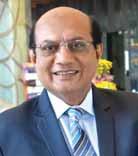
Dear Rotarians,
To get the best out of your lives, face your past without regret, Handle your resentment with confidence, prepare for the future without fear.
- Bhagavad Gita
Come July 1, the Rotary Wheel turns; it is time for change of guards in each Rotary district and club and a new is being created, bringing with it new hues of colour, freshness, commitment, vigour and thought process.
It is the right time for the new team members to tighten their belts to re-dedicate themselves to serve the world. The needs in the world are greater and more diverse than ever before. Despite challenges we face making the world more equitable, more just, covering a broader range of human needs, and the work required amounts to a steep mountain climb. Yet the climbing must be done.
As Rotary opens doors, let us seize the opportunity to lead the way to carry out RI President Holger Knaack’s programmes in the coming year, with service above self, making a difference to the lives of the less fortunate around us. For trouble shared is trouble halved!
In these trying times, it is important to be innovative, think out-of-the-box, find opportunities in the new normal to grow Rotary, making it stronger, more adaptable, and even more aligned with our core values. As we evolve using our Strategic Plan, let us explore increasing our membership by forming more flexible clubs and inducting more women into Rotary.
We have elevated Rotaract, let us ensure they play an integral role by giving them leadership opportunities, thereby bringing energy and better solutions to our organisation.
Remember: the secret of change is to focus all your energy not on fighting the old, but in building the new.
With best wishes,

Kamal Sanghvi RI Director, 2019–21
Board of Permanent Trustees & Executive Committee
PRIP Rajendra K Saboo RI Dist 3080
PRIP Kalyan Banerjee RI Dist 3060
RIPE Shekhar Mehta RI Dist 3291
PRID Panduranga Setty RI Dist 3190
PRID Sushil Gupta RI Dist 3011
PRID Ashok Mahajan RI Dist 3141
PRID Yash Pal Das RI Dist 3080
PRID P T Prabhakar RI Dist 3232
PRID Dr Manoj D Desai RI Dist 3060
PRID C Basker RI Dist 3000
TRF Trustee Gulam A Vahanvaty RI Dist 3141
RID Dr Bharat Pandya RI Dist 3141
RID Kamal Sanghvi RI Dist 3250
RIDE A S Venkatesh RI Dist 3232
Executive Committee Members (2020–21)
DG Sanjiv Rai Mehra RI Dist 3011
Chair – Governors Council
DG Sudip Mukherjee RI Dist 3291
Secretary – Governors Council
DG Sangram Vishnu Patil RI Dist 3170 Secretary – Executive Committee
DG Prashant Harivallabh Jani RI Dist 3060
Treasurer – Executive Committee
DG S Muthupalaniappan RI Dist 3232
Member – Advisory Committee
ROTARY NEWS / ROTARY SAMACHAR Editor Rasheeda Bhagat
Senior Assistant Editor Jaishree Padmanabhan
ROTARY NEWS TRUST
3rd Floor, Dugar Towers, 34 Marshalls Road, Egmore Chennai 600 008, India. Phone : 044 42145666
e-mail: rotarynews@rosaonline.org Website: www.rotarynewsonline.org
Now share articles from rotarynewsonline.org on WhatsApp.

Jenny Llakmani
RI President Holger Knaack has a fresh vision for the Rotary of the future. With a little help from his friends, things should go swimmingly.
Holger Knaack is vacuuming.
The Rotary Club of Herzogtum Lauenburg-Mölln has wrapped up its annual Christmas bazaar in the cloister of the 12th-century Ratzeburg Cathedral. Two days of selling handicrafts, mistletoe, and homemade cakes and cookies have netted the club some 8,000 euros, which this year will go to a German nonprofit that supports children who are critically ill. As the club members break down booths and put away tables and chairs, Knaack grabs the vacuum cleaner and head down in concentration, tackles the crumbs, dirt, and bits of tinsel that litter the floor.
At this moment, Knaack is president-elect of Rotary International, preparing to take office on July 1, 2020. But at the same time he’s a regular
Rotarian, a 27-year member of his club, pitching in like everybody else. “He just wants to be one friend among friends,” says club member Barbara Hardkop.
There’s a German phrase: man holt die Leute ins Boot. It means getting people on board to work together toward a common goal. In the coming year, Rotarians will find that Knaack is not one to stand on the sidelines while others do the work. But equally important for him is the philosophy that working hard doesn’t mean you can’t also have a good time. As he spends this year getting people on board — especially to carry out his highest priority, investing in young people — he will also be doing his best to make sure everyone is enjoying themselves.
“It’s a basic principle with Holger,” says his longtime friend Hubertus
Eichblatt, a fellow club member. “When we get together, it has to be fun.”
Knaack is an atypical Rotary president, and not just because he wears jeans and eschews ties much of the time. He’s the organisation’s first German president, and he came to that position in untraditional fashion. Unlike many of his predecessors, he didn’t rise step by step through the ranks of Rotary offices. He served as club president and district governor, but he had held only one RI post, that of training leader, before becoming director. And he remembers being at a Rotary institute where people asked him what other district offices he had held before becoming governor.

“I said, ‘None. None.’ All of them were very surprised,” he recalls. What Knaack is most known for is his involvement in Rotary’s Youth Exchange programme. That experience is deep, broad and extraordinarily meaningful to him and his wife, Susanne. They have no children of their own, but have opened their home — and their hearts — to dozens of students. “The Knaack house is always full of guests, especially young people,” says Helmut Knoth, another friend and member of his club. “They’ve had hundreds of guests over the years.”
Shortly after joining his Rotary club in 1992, Knaack helped out with a camp for short-term Youth Exchange students in northern Germany. He was immediately hooked. “I thought it was a really great programme,” he
says. “This is something, you’d say in German, wo dein Herz aufgeht: Your heart opens. Whenever you talk to the young people, they’ll tell you, ‘It was the best time in my life.’ Sometimes I think they are surprised about themselves, about what they are able to do, and about the possibilities that are open to them through Rotary.”
The opportunities opened for Knaack, as well. He became Youth Exchange chair for his club, and after serving as governor of District 1940 in 2006–07, he was asked to chair the German Multi-District Youth Exchange, a position he held until the day before he started his term on Rotary’s Board of Directors in 2013. Along the way, he notes, he always relied on other people. “You develop a vision together, and then let’s go ahead,” he says.


“Everybody’s going a little different way; there’s never just one road. But the goal should be the same.”
Young people seem to intuitively understand his way of doing things. “Holger has a vision, and he is executing on that vision,” says Brittany Arthur, a member of the Rotaract Club of Berlin and the Rotary Club of Berlin International. “And you recognise that this vision is not new for him. Holger and Susanne have had dozens of Youth Exchange students. Do you think they did all that so that in 2020 he could say, ‘We need to invest in youth’? This is who they are.”
Brittany also sees Knaack as unusual in his willingness to invest in “potential, not experience.” In 2012, as an Australian Ambassadorial Scholar in Germany, she had a brief exchange


with him at a club meeting. That led to her speaking about her “Rotary moment” at a Berlin peace forum sponsored by 2012–13 RI President Sakuji Tanaka. After her presentation, she thought she was done. But Knaack, who had organised the forum and was now putting together a Rotary institute, had other ideas. “I had just finished speaking to hundreds of Rotarians,” she recalls. “I was feeling so great, and he said, ‘Do you want to help with the institute?’ and I said, ‘Yes!’ ”
Like other Rotarians, she perceives the depth of Knaack’s persuasive personality. “He’s super funny and nice, but he’s dead serious when it comes to certain things. Which is why he’s such an interesting leader: He can show up on so many different levels when you need him.”
Holger and Susanne Knaack love to travel, but they have lived their entire lives not far from where they were born: she in Ratzeburg and he in the nearby village of Groß Grönau, about 40 miles northeast of Hamburg. Their upbringings were remarkably similar. Each was born in 1952 and lived over the shop of the family business: Susanne’s father and grandfather were sausage makers, and Holger’s family bakery was founded by his greatgreat-great-grandfather in 1868. “We were very loved,” Holger remembers.

The Küchensee, one of Ratzeburg’s four lakes, provides a scenic backdrop for lunch with President Knaack’s sister, Barbara (left), and Susanne’s sister, Sabine (right)
“Everybody took care of you; everybody always knew where you were.”
Hubertus Eichblatt also grew up in Ratzeburg, where his sister and Susanne, whose maiden name was Horst, were childhood friends. “The Horst family had a very open house, and it’s exactly the same with Holger,” he says. “Friends are always coming in and out.”
that surround Ratzeburg. They often lunch together as well, followed by more coffee. Then Knaack has a ritual: He folds his long frame onto a little sofa for a nap while Susanne, Barbara and Sabine continue their chat. “He likes to hear us talking while he’s napping,” Sabine says.
He’s super funny and nice, but he’s dead serious when it comes to certain things, which is why he’s such an interesting leader.”
Holger and Susanne live in the home that once belonged to Susanne’s grandmother; next door, Susanne’s sister, Sabine Riebensahm, lives in the house where the two grew up. About a decade ago, after her husband died, Holger’s sister, Barbara Staats, moved into an apartment on the top floor of that house. The two homes have a total of nine guest rooms, and what with Barbara’s 12 grandchildren, dozens of current and former Youth Exchange students, and various other friends, at least one of those rooms is usually occupied. Every morning, everyone meets for coffee in a cozy nook off Holger and Susanne’s living room, where floor-to-ceiling windows offer views of the Küchensee, one of four lakes
The four share duties, including shopping and cooking. “When someone needs something, you just shout,” Holger says. “I think this is the perfect way to live: together. The secret to anything is to ask: What’s our goal? This is exactly our goal, how we live right now.”
One Saturday in December, Holger, Susanne, Barbara, and Sabine are preparing boeuf bourguignon to serve at a dinner party for 23 close friends the Knaacks will be hosting the next day. They’re simultaneously planning the menu for Christmas, when they’ll have 15 people — 16 if a young Egyptian woman who is studying in Germany, the daughter of some Rotarians they met at a Rotary institute in Sharm el-Sheikh, takes them up on their invitation.
Helmut Knoth calls the Knaacks’ hospitality “a stroke of luck for Rotary. At least once a year we have a party there, in their beautiful garden,” he says. “When the weather is nice, we go swimming. In winter, there’s a traditional event for Holger’s birthday. We meet at the rowing club and hike around the lake.” All the birthday gifts are donations to the Karl Adam Foundation, which Knaack founded to support the rowing club. (Ratzeburg is world-famous for its rowing club, whose members formed the core of the German teams that won gold at
the 1960, 1968, 2000, 2004, and 2012 Olympics. The club’s co-founder and longtime trainer, a local high school teacher named Karl Adam, is considered one of the best rowing coaches of all time and developed what’s known as the “Ratzeburg style.”)
Looking through family photo albums, the Knaacks talk about childhood vacations to the seaside — Holger and his family to the island of Sylt on the
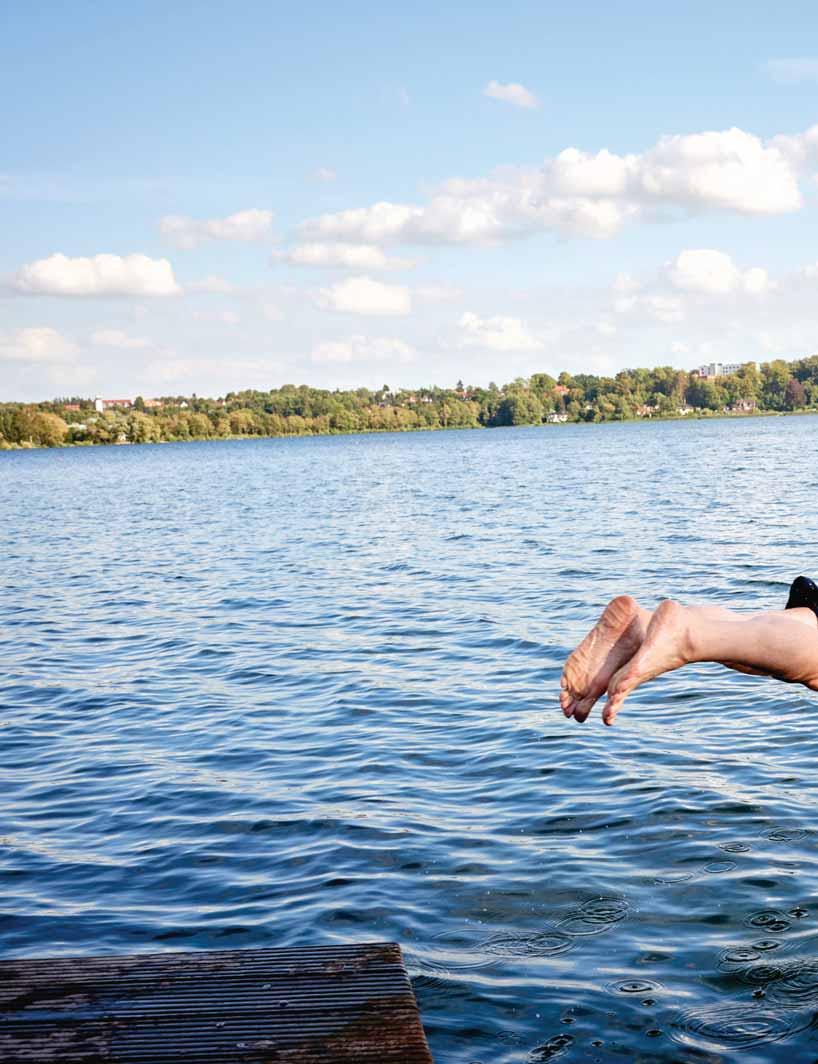
President Knaack dives into the Küchensee. Is there an analogy to his leadership style? Sure — it’s got to be fun.
North Sea, and Susanne and her family to the Baltic Sea coast. A few kilometers from their home, Holger’s family also had a small summer house with a large garden where they would spend weekends. The forests and meadows were his to explore. “It was a perfect childhood,” he says.
Holger’s boyhood home was situated about 500 metres from a small river, the Wakenitz, that formed the border with East Germany. “For me, that was really the end of the world,” he remembers. In the summer, he and his friends would test their courage
by swimming across the river. On the other side was a swamp, a minefield, and watchtowers manned by East German guards. After the fall of the Berlin Wall in 1989, he says, “the first thing we did was to explore the other side by bicycle. All the watchtowers were open. I had never seen our own village, or our own house, from that perspective.”
As a young man, on holidays and weekends, he worked as a driver

for his family bakery. After finishing secondary school he learned the trade, working in another bakery for two years for his Ausbildung, or apprenticeship. “So I can bake a lot of things,” he says cheerfully. “And I still like to bake. You have to love what you do in order to be very good. Whatever marketing techniques you may use, it’s all about the quality. Quality is about loving the product and trying to make it the best you can. But you have
to take your time. That’s the secret to many things.”
After completing his Ausbildung and another year of internship in a large bread factory in Stuttgart, he went to the city of Kiel to study business administration. At the first student assembly, he caught sight of his future wife. “I saw Susanne on the 20th of September 1972,” he says. “I remember that quite well.”

Ratzeburg with its 12th-century cathedral and its glacial lakes.
Holger didn’t make the same impression on Susanne, perhaps because there were 94 men and only three women in their class. But they soon got acquainted, and on weekends, they would drive home together to each work in their family’s business. Before returning to Kiel on Sunday evenings, they would load up the car with bread from the Knaack bakery and sausage from the Horst shop. “Our friends always knew to come over on Mondays,” Susanne says with a laugh. They graduated in 1975 and got married the next year. Each of them continued to work in their own family’s business. At the time, the Knaack bakery had several shops and about 50 employees. After taking over from his father in the late 1970s, Knaack decided to expand the company. He also decided that he wanted to know exactly where the grain used to bake his bread was coming from. So he turned to his friend Hubertus
Eichblatt, a farmer, who started a cooperative with other farmers. Knaack also worked with Günther Fielmann, Europe’s largest optician, who invested in cultivating organic grain on his own farm, Hof Lütjensee. Together Knaack and Fielmann built their own mill and marketed organic baked goods — something new 30 years ago. “Holger was always very innovative,” Eichblatt says, “very forward-thinking about those kinds of things.”
Another of Knaack’s innovations was to move the baking of the bread into the shops. Before that, bread was baked in the factory and the loaves were trucked to the shops. Knaack’s idea was to continue to make the dough in the factory, but then to freeze it in portions that were distributed to the shops to be baked. His motto was Der frische Bäcker — “the fresh baker.” Today, almost every bakery in Germany does it that way.
Knaack kept expanding the business; eventually there were about 50 shops and the factory with hundreds of employees. He received an offer to buy his company from an internationally active firm that was investing in bakeries. It was a very good offer, and Knaack took it. Still a young man in his 40s, he pursued other business ventures and took up golf (and was quickly tapped to be president of his golf club). He had been an active member of Round Table, an organisation for people under age 40; at 39, he joined the Rotary club in the nearby town of Mölln (remaining a member there even when a new club was chartered shortly afterward in Ratzeburg with many of his friends as members). And before long, he found his calling with Rotary Youth Exchange.
Medieval Ratzeburg, with its ancient cathedral and half-timbered
burghers’ houses, is situated on an island surrounded by four glacial lakes. The northern German state of Schleswig-Holstein is dotted with such lakes; winding roads lead through rolling green countryside past farms and villages built in the characteristic regional style of brick architecture. But the students who have stayed with Holger and Susanne have found something much deeper than a picture-postcard experience of Germany.
students the Knaacks hosted in 1996. After returning home to Slovakia, the 16-year-old sent a card to Holger and Susanne, who invited him back
father died of a heart attack, the young man told the Knaacks he couldn’t come after all. Holger and Susanne,
the visit go on as planned.
“I stayed one month with them, and they did everything to help me,”
been close friends. If I had not met Holger and Susanne, and if they had not mentored me in many aspects of my life, I would not have achieved
I think this is the perfect way to live: together. The secret to anything is to ask: What’s our goal? This is exactly our goal, how we live right now.
private equity company in Vienna, but he’s not talking about material success. “I went from zero to somebody, not in terms of money, but in terms of a healthy personality.”
He and Holger “always had deep -
its every year. “He told me that money is not the most important thing, that I have to enjoy my work and I should also enjoy life. He told me I should travel and see the world. And he took me to many meetings with his friends, Rotarians. I didn’t understand why at the time, but when I got older, I realised it was an absolutely unique chance to learn how

to behave with people you don’t know. He grew me up.”
About the Knaacks, he says: “They have a big heart and a strong responsibility for the people they are mentoring. They are different from other people. They are championship league people.”
They take that responsibility to mentor students seriously. “The major goal of Youth Exchange is to dive into another culture, to learn everything you can about that culture,” Holger says. “And the amazing thing about Youth Exchange is that parents send their kids around the globe and trust that Rotarians will treat them like their own children. It’s something that makes us unique. No other service organisation does it this way.”
Paula Miranda spent three months with the Knaacks, who were her first hosts during her exchange year in 2008. She arrived in Ratzeburg from her home in Argentina in January: “I remember it was 4pm. It was already dark in Germany, and I was like, oh, my God, where am I? And they welcomed me with a German meal.”
When Miranda turned 19 a month later, Holger and Susanne organised a birthday party with some of her new friends from school. “They made barbecue asado like we do in Argentina,” she recalls. “They wanted to make me feel at home, and I really appreciated that. My year wouldn’t have been the same without them. I really love them.”
Alois Serwaty, a past governor of District 1870, first met the Knaacks 25 years ago at a German Multi-District Youth Exchange conference. “Both Holger and Susanne have an uncomplicated and open manner that appeals to and motivates young people,” he says. “When you meet them, you recognise right away that they like young people. Holger’s attitude is that Rotary must remain young and that working

for and with young people keeps you young.”
in December, and he has not changed in 24 years. He’s still the same, maybe just some wrinkles. This Youth Exchange programme gives him energy.”
Aphrase you hear often among German Rotaractors is auf Augenhöhe begegnen — to meet someone at eye level. “That means everyone is equal, on a level playing field,” Susanne says. “It doesn’t make any difference if
someone is a director or a driver. You discuss something and come up with a solution without the other person feeling like he’s received an order.”
According to his friends and family, Holger has a real flair for this. “If he can’t do something himself, he can delegate really well,” Susanne laughs. “He can recognise who would be good at something. It’s a talent of his.”
One example, she says, is the success he had working with Rotaractors on the Rotary institute in Berlin. “They said, ‘We’ll do the breakout sessions,’ and instead of saying, ‘You can’t do that,’ he said, ‘Go ahead.’ He trusts people to succeed. But he’s still in the background keeping an eye on things. It was the same for the convention in Hamburg,” where Knaack and Andreas von Möller were co-chairs of the 2019 Host Organisation Committee. “There were lots of Rotaractors involved there too.”
One of her husband’s main goals, Susanne says, is to continue to bring Rotary and Rotaract closer together. “He’s excited about what he wants to accomplish.” And when he’s excited about something, “he’s able to get others excited as well,” adds Susanne’s sister, Sabine. As Brittany Arthur noted, “You feel like you’re investing in his vision.”
Over cappuccinos in the sunny cafe of Ratzeburg’s Hotel Seehof, with its views of the sparkling Küchensee, Knaack’s friends Hubertus Eichblatt, Helmut Knoth, Jens-Uwe Janssen, and Andreas-Peter Ehlers — like Holger, all members of the Rotary Club of Herzogtum Lauenburg-Mölln — agree that he possesses a certain genius for marshalling volunteers. Ehlers remembers how it was when he served as district secretary during Knaack’s year as district governor. “Before that time,” he says, “under other governors, it was always ‘somebody should do this’ or ‘who is going to do this?’ But
Holger would say, very specifically, ‘Hubertus, I’ve been thinking about it, and you’re the perfect person to do this. Here’s how I envision it. This is just right for you, Hubertus, I would really love it if you did this. It’s great that you’re going to do this!’ The way he puts it to you, you can’t say no. And you do it gladly, because he doesn’t hand it to you and then walk away. He comes back in a month and asks, ‘Hubertus, everything going OK? Can I help with anything?’ ”
Eichblatt laughs at this depiction, but stresses that Knaack is successful because his enthusiasm is infectious — and because he sets the example: “He exemplifies these positive characteristics, so it’s relatively easy for him to convince people to do things.”
As they chat about Knaack’s good qualities, they echo what many people say — that he’s never in a bad mood. But close friends that they are, they insist he’s not perfect. “We have to find a weakness,” muses Eichblatt, before settling on a benign character flaw. “He’s very fashion-conscious. His glasses!”
The mention of Knaack’s signature eyewear elicits an immediate reaction from the group. “He’s the only one who wears glasses like that,” Ehlers says. “And if they break, no problem: He has another pair!”

“They’re his trademark,” Knoth adds. “I’ve only ever known him to wear these glasses. And he seldom wears a tie. Jeans, always. He looks youthful. He is youthful!” The old friends nod and laugh as they finish their cappuccinos.
Knaack’s philosophy — that no matter how hard you work, you should also have fun — applies especially to Rotary. “Travelling around, talking with people, is really fun for him,” says Susanne, a charter member of the Rotary E-Club Hamburg Connect. “Rotary is fun for him — and it’s just as much fun for me.”
proud. It has to feel special to be a Rotarian.”
Holger told me that money is not the most important thing, that I have to enjoy my work and I should also enjoy life.
Knaack wants everyone to enjoy Rotary — and to be proud to be part of it. “All of us love this organisation, and all of us should feel we ought to do something to make Rotary stronger,” he insists. “It’s not hard to do more: be more involved in your club, more interested in your friends, more involved in projects and programmes. Ask yourself: Is our club involved in youth service? Can we come up with better ideas for fundraising? And the club also has a responsibility to make people feel good, feel welcome, feel
As he thinks about the year ahead, he notes that a Rotary president gets invited to lots of events, including district conferences, and sends a representative to most of them. But Knaack plans to attend — if only virtually — the conference in District 1940, whose governor this year, Edgar Friedrich, is a member of the Rotary Club of Herzogtum Lauenburg-Mölln. “I think you’re allowed to make an exception for your own district, especially if the district governor is from your own club,” Knaack says. “Your Rotary club is really important. Whatever office you have had in Rotary, and however important you were, at the very end, you’re always a member of your own Rotary club and happy to be among your friends.
“That’s why we need to take care of our Rotary clubs, and our friends in our clubs. It doesn’t matter if you were president. At the end, it’s important that you’re among friends.”
His first priority during his year as RI President will be “to grow Rotary at all levels. Membership is our first internal priority, while polio is our external priority,” RI President Holger Knaack said, addressing a virtual meet of PETS, RI District 3201. His other top priorities would be getting more young professionals and women who occupy leadership positions into Rotary.
In a conversation with PDG Sunil Zachariah, and answering a question on what Rotary was doing to promote more women in leadership positions, he said: “We are doing what we can do, that
means we can promote them, inspire them and ask clubs and districts to look for women in more leadership positions. But we can’t control that. What we can control are our regional leaders, coordinators, and training leaders. So whatever RI can do, we are doing.”
And there was evidence that sometimes it worked. “A few years ago there were no women members on the RI Board. But on my board, next year, there will be six women and on Shekhar Mehta’s board, there will be eight women. So we are making progress.”
When asked to clarify the new Rotary mantra that there is “no wrong age to join Rotary”, and its contradiction
with the search for younger members, Knaack said, “Yes, we are looking for young professionals, specially in areas like Europe, where the average age of Rotarians is increasing year by year, as also in the US and South America. This is necessary to ensure that Rotary remains relevant. But that doesn’t mean we are not looking for other members.”
Elaborating, he said that in the US and “my own country, there are so many early retirees; people who are looking for an opportunity for service, for networking and they have the time and the passion… so we are looking for those people too. Because they can contribute so much to our organisation.”

RIPE Holger Knaack addressing the presidents-elect of RID 3201. PDG Sunil Zachariah is also in the picture.

As a strong votary of Rotaractors, what would he recommend Rotary clubs do to make Rotaractors feel at home and comfortable, as from July 1, Rotaractors will be equal members of Rotary?
Knaack responded: “First of all, it is all about mutual respect between Rotarians and Rotaractors, if we really want to work successfully together. Because those young professionals are so much like us; they are as successful in their clubs as we are in our Rotary clubs. They may be younger than us but they are as effective as we are. So we have to extend a strong co-operation to them.”
To attract young professionals into Rotary clubs Rotarians should first of all have a “strategic meeting of the club and look at what value you have to offer to young professionals. The next question is, do we, in our club, meet the needs of young professionals? If you think about our costs, our meeting time and location of those meetings, are these locations
where young people would love to go? We really have to look at the needs of young professionals,” he added.
Asked if environmental concerns will become the seventh area of focus in Rotary, Knaack said: “We are all excited about the next Board of Trustees meet. I don’t want to put pressure on them but all of us can be excited about what we are going to hear from our Trustees,” he smiled.
Next Zachariah asked him as the first international president to take office virtually, what was his learning from this pandemic, as well as challenges and opportunities for the future.
Knaack said the corona pandemic had offered so many “learning opportunities. I am the first president in direct contact with so many Rotarians across the world through virtual meets. I am hopeful that before the end of my year, I will be able to
In a major water body conservation project, RC Bangalore Rajmahal Vilas, RID 3190, has taken up the restoration of a huge lake spread over 19 acres in the Arkavathy catchment area at Koira village near Bengaluru at a cost of `70 lakh. DG Sameer Hariani inaugurated the project aiming to increase the storage capacity from 1.15 lakh to over 1.71 lakh cubic metres, to benefit around 200 villagers, farm activities and livestock.
“After the lockdown was lifted, we commenced the work under
travel and meet Rotarians personally. But with daily Zoom meetings with Rotarians across the world I feel very close to them, and it’s a really good connect.”
This pandemic had taught all senior leaders “a new way to connect and definitely in the future there will be more board meetings virtually. We are flexible and of course saving costs because everybody can do this from their own homes. We will take this learning into the future.”
So will the Taipei convention be held virtually too? “Well, as I said all of us are learning from this experience, and I do hope that the convention will be in person. But I can tell you that several parts of it will be digital. So we’ve already decided at the RI leadership level that we will stream online several plenary as well as breakout sessions. But we will learn more about the online experience in a couple of weeks when we have our first virtual convention in June and we will see many more virtual part of the convention in 2021,” he added.
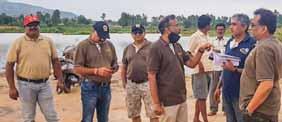
the supervision of Rotary RMV Arkavathy Community Corps formed to implement this project,” said Sanjay Krishna, Club President. The increased water storage will also help in the restoration of Arkavathy River, a major tributary to TG Halli Dam, more popular as the Chamarajsagar Dam, a major source of drinking water for residents of western Bengaluru with a population of 30 lakh.
As the lake does not have effluents or any pollutants from nearby areas,
“the water stored can be used for agriculture and drinking,” he said.
Covid relief work
The club distributed 1,700 dry ration kits to needy families at a containment zone in Gedalahalli, Bengaluru and till May 5, donated 70 tonnes of dry rations with each 40 kg kit containing rice, dal, sugar, salt, oil and soap. A team of 15 volunteers and 15 Rotarians put in 10 hours of service per day for a week to distribute the food kits.
Rasheeda Bhagat
For thousands of Rotarians across the world, particularly those who’ve made it a point not to miss a Rotary Convention, it must have been a heartbreaking moment… to watch the Honolulu Convention sessions online from their homes. And RI President Mark Maloney expressed this sentiment when he began his opening session statement thus: “Although we had intended to livestream convention
events from Honolulu, never in our wildest dreams did we anticipate that our entire convention would be only online. But as has often been said, ‘Necessity is the mother of invention’, and as we continue to cope with the Covid-19 crisis, the world needs our optimism, our leadership, our compassion, and our connections as never before.”
For him and spouse Gay, the past 33 months had been a remarkable
Rotary journey as he had served as nominee, elect, and President of RI, travelling on virtually “every airline in the world, circumnavigating the world twice and moving between the northern and southern hemispheres.” But they had spent the last three months at home, “an unexpected stretch of 90-plus nights, unheard of for a Rotary President.” As the entire world had put people’s health above everything else, RI too had to take

some “difficult decisions including the cancellation of the in-person convention in Honolulu.”
But ever innovative, Rotarians across the world had embraced the challenges posed by the Covid pandemic; “we have cared for those most in need in this crisis. With a remarkable array of energy and resourcefulness, we have taken care of one another, shared our resources and stepped forward to make a significant difference.”
Reiterating that even though unable to greet Rotaractors in per son, “Rotary continues to celebrate Rotaractors as full partners in the Rotary family”, Maloney said, “we had hoped to hold the most familyfriendly Rotary convention in history. Instead, we are at home connecting with our families as never before; taking care of all generations; and responding to the essential needs of our families — health, education, and support.”
One dream — to hold the most environmentally-friendly convention in Rotary history — had been realised. “We are holding a Rotary convention like no other with no air travel, no hotel rooms, leaving a remarkably small carbon footprint!”
The RI President said that during his year, his emphasis was on growing Rotary, adapting to changes, so together Rotarians could achieve more. He was delighted to note the manner in which Rotary clubs had made “such a huge impact around the world during this crisis.”
On the need to form new and innovative clubs to grow Rotary, Maloney said the 2019–20 governors had attained new milestones in the formation of new clubs this year. The challenge now was to create and offer members “new club experiences and extend our reach beyond regular meetings focused on meals.”

He once again underlined the need to “balance Rotary and family commitments. We must continue to open doors to families at events at every level of Rotary. Families provide the strong base from which we reach out to the community. And, as this pandemic has illustrated, we treasure our families above all.” No Rotarian should be ever asked to choose between Rotary service and the family. It was also important to “build the path to Rotary leadership for those who remain actively involved in their professions.”
Maloney said Rotarians can be proud that not only during a crisis, but for all time, “Rotary offers something no other organisation can match — an existing infrastructure which allows people from all over the world to connect in a spirit of service and peace.” As Rotarians continued to do the work necessary to rid the world of polio, “our decades of work in polio will help address the coronavirus pandemic as an added value. The PolioPlus infrastructure will be critical once
a coronavirus vaccine is ready. But make no mistake, we will rid the world of polio. And we are hopeful that Africa will be certified poliofree in the near future.”
This year, on June 26, the UN celebrates is 75th anniversary and Rotarians could be proud that the UN Charter was an accomplishment facilitated by many Rotarians. “Whether we are working toward clean water, better health, improved education, or economic stability for the world’s least privileged — Rotary shares the United Nations’ commitment to a healthier, more peaceful, and more sustainable world,” Maloney added.
Addressing the opening session UN Secretary General Antonio Guterres said that since the chartering of the UN 75 years ago, “we have worked closely to bring people together and find solutions to their problems.” He acknowledged the work done by Rotary in “eradicating polio, strengthening communities around the globe, alleviating the suffering of vulnerable populations

For those Rotarians who have been hearing for years about the connection between Rotary and the UN, the virtual convention had an interesting presentation. Here is a short account:
In 1944, nations around the world stared in horror at the devastation of World War II. But even as the battles raged, global leaders planned for a new era, and a post-war organisation for peace. RI, long-committed to global cooperation and peace, had been raising awareness of a United Nations — publishing articles and pamphlets to encourage the discussion.
In June 1945, the eyes of the world were on San Francisco, as delegates from 50 countries gathered to sign the UN Charter. As they gathered, delegates read about the end of the war in Europe. At the invitation of the US Secretary of State, RI sent eleven Rotarians to serve as consultants to the delegation from the United
States, including two past Rotary presidents: Allen Albert and Tom Davis. In fact, there were other Rotarians and honorary members from around the globe; some as official delegates for their nations and others as consultants.
Ezequiel Padilla served as chair of the delegation from Mexico. Carlos Romulo represented the Philippines and would later serve as President of the 4th Session of the UN General Assembly.
There was a triumphant ceremony, as representatives signed the Charter for their nations.
Joseph Salem, from Lebanon, was just one of the Rotarians who signed the Charter on behalf of their countries.
US Secretary of State, E R Stettinius was a signatory for the United States. He later described the invitation to Rotary International as “a recognition of the practical part Rotary’s members have played and will continue to play in the development of understanding among nations.”
Rotary’s participation in the UN Charter Conference was just the beginning of a humanitarianfocused collaboration that continues. Both the organisations, said the presentation, “serve as examples of global cooperation as they lead efforts to promote peace, development, and world health.”
and building a safer, healthier, and more peaceful world.”
Today, as the world “faced a global pandemic, the most severe economic crisis for generations, and an acute climate crisis, the most vulnerable are those facing the greatest risk. Now, more than ever, we need to work together to find solutions to the weaknesses of our societies by reducing inequalities, supporting and strengthening the resilience of communities and charting a path to a better world through the Sustainable Development Goals. The UN is with you,” he added.
In a video titled “People of Action” the opening session brought voices from New York, San Francisco, Italy, Kenya, Portugal, Mississippi, San Diego, Tokyo, Netherlands, Honduras, France, Nepal, Romania and Pakistan highlighting the outstanding relief and community support work done by Rotarians across the world.
These Rotarians talked about helping charities and hospitals, healthcare professions, distribution of food and even “tulips to thank our local healthcare professionals”, production of facemasks and other protective equipment, setting up of handwashing stations, pantries and so on. While the Rotarian from Italy, one of the worst affected countries, talked about donating “new technology” to 28 hospitals, and “40 tablets for sick people to keep in touch with their families via video,”, the one from Honduras highlighted the plight of the underprivileged who lacked even the most basic facilities and were helped by Rotarians.
Convention Chair Celia Elena Cruz de Giay addressed the opening session.

The Rotary Foundation Trustees and RI Board of Directors have unanimously approved adding a new area of focus: supporting the environment.
More than $18 million in Foundation global grant funding has been allocated to environment-related projects over the past five years. Creating a distinct area of focus to support the envi-

ronment will give Rotary members even more ways to bring about positive change in the world and increase our impact. Supporting the environment becomes
Rotary’s seventh area of focus, which are categories of service activities supported by global grants. It joins peace-building and conflict prevention; disease
Grant applications for environment-related projects will be accepted from July 1, 2021.

prevention and treatment; water, sanitation and hygiene; maternal and child health; basic education and literacy; and community economic development.
Grant applications for projects will be accepted from July 1, 2021. Gifts and commitments from Rotarians and others will be sought to provide global grant support for the new area of focus.
Rotary.org
Rasheeda Bhagat

Addressing the opening session of the virtual convention, Trustee Chair Gary Huang, described the Covid pandemic as an “invisible enemy” and said that for 44 years during his journey as a Rotarian, he had always looked “forward to the month of June, when my Rotary friends come together from all corners of the earth for the convention, like a mini-United
Nations conference. We shake hands and high-five each other, celebrating our fellowship, and renewing our dedication to the global community. But this year the pandemic has hijacked our festival.”
But refusing to be “held hostage” Rotarians had used modern technology tools to gather online from thousands of towns. “We now form an even bigger group than we would have without the pandemic.”
More significant, he added, he was the first leader in RI’s history to address the session in Chinese! Saying that the present pandemic required Rotarians “to not only be compassionate but creative in our outreach,” he said they had done just that. In February itself, TRF had acted fast to help Rotarians protect themselves, their neighbours and communities. Making Covid-19 projects eligible for disaster response grants, “as of June, we have disbursed more than $5.2 million to Rotary clubs. We have also made it easier to use global grants to respond to Covid-19, and so far, almost $14 million for global grants have been used to fight Covid-19.”
Clubs could also use district designated funds and repurpose previously planned activities to support Covid projects, Gary said.
Rotary’s “empathy, generosity and simple kindness” were essential, powerful tools in global recovery from this pandemic. “Rotarians in countries such as Japan, India, US and Italy are meeting online to support each other through fellowship, and brainstorm ways to help their communities. Some clubs invite disease experts to educate members about the virus, while others check up on seniors, leaving groceries and flowers on their doorsteps.”
The Trustee Chair added that today in “our highly mobile and interconnected world, pandemics have become a much larger menace than in the past, threatening our collective health security. They call for broad collaboration.”
TRF required continued support from Rotarians, and it is essential to expand the Arch Klumph Society, which recognises the Foundation’s most generous donors who contribute
These are not the happiest circumstances, of course. However, no incoming Rotary President has ever had the opportunity to meet so many fellow Rotarians, and that is a good thing.
Asia. In 2015, when he served as RI President, “the Zika virus and water issues threatened our convention in Sao Paulo. But for each challenge, we soldiered on, and rallied our troops to turn things around. After each battle, we emerged stronger and wiser. If the experiences in Taiwan, Hong Kong, South Korea and Australia showed us anything, it is that this global crisis can be contained.”
meet so many fellow Rotarians, and that is a good thing.”
When he had talked about “change and revolution” in his theme speech at the International Assembly in January, “I had no idea that those changes would happen so quickly!”
$250,000 or more. So far, over 100 new members had joined, a 25 percent increase over the same period compared to last year.
Also thanks to the generosity of Rotarians, by April end, TRF had raised over $336 million, including $92.2 million for the Annual Fund, $81.1 million for the Endowment Fund, $134.1 million for the PolioPlus Fund — including a $100 million match from the Bill & Melinda Gates Foundation — and $28.7 million in other contributions. “With your assistance, we can still meet our comprehensive fundraising goal of $400 million,” he added.
While Rotarians’ contributions would help fight the corona pandemic, polio, “which used to terrorise many countries and paralysed the lives and dreams of children”, should not be forgotten, he added.
Quoting Charles Dicken’s famous opening passage “it was the best of times…” in his book Tale of Two Cities , Gary said he could think of no better way to “describe the time we live in now.” But then this wasn’t the first challenge he had seen as a Rotarian over the years; as RI Vice President in September 2001, when he was in the US on an RI assignment, he watched a plane fly into the World Trade Center, destroying it. Two years later, when he was a TRF Trustee, SARS struck many parts of
He was proud to see that Rotarians were doing “what we do best — rising above the conflicts, and coming together to form a formidable force.”
Addressing the convention on the second day, RIPE Holger Knaack said that the Covid pandemic had forced Rotarians to watch this convention from their homes. “These are not the happiest circumstances, of course. However, no incoming Rotary President has ever had the opportunity to
While the entire world had to “conduct business and maintain friendships differently than ever before, Rotary must continue to respond and adapt. And that brings many new opportunities for us, to innovate and use this moment as a catalyst for change.”
But then change had always been an essential part of Rotary’s mission. Towards the end of World War II, Paul Harris said: “I would like to think that the pioneering days of Rotary have only just begun ... kaleidoscopic changes are taking place, many of them without our will ... Rotary simply must continue to pioneer or be left in the rear of progress.”
Once again Rotary found itself in “such a moment of crisis and change



that Paul Harris had described. It is also a time when we see our focus shifting. We now see that growing Rotary truly means taking care of our members.” Club leaders would have to keep members engaged and eager to stay on, return to Rotary’s most basic commitment of service above self, and stay true to its core values — service, fellowship, diversity, integrity and leadership.
Knaack also urged Rotarians to make the most of “the new, strengthened partnership between Rotary and Rotaract. We need the energy, commitment and leadership of young people like never before.” While some might find it difficult to adapt to change, he asked them to “remember, whether your meetings take place over lunch or in virtual space, Rotary is still about making and sustaining friendships for life.”
Also, this pandemic had given Rotarians “new possibilities to deepen friendships with people we might have never met before. Now we can interact with them in Zoom conferences. Now the person who lives across the ocean can be just as much a part of our team as someone who lives down the street. This is a great opportunity for
RIPN Shekhar Mehta
us… to reach across generations and cultures. We all become equal through technology.”
Embracing change also meant “empowering young professionals and more women to take on greater roles and responsibilities in Rotary — and we must increase our membership numbers through diversity,” he added.
In his remarks, RIPN Shekhar Mehta thanked RI and Rotarians “for reposing your confidence in me through the Nominating Committee” and selecting him RI President for 2021–22, something that he accepted with “honour and humility” and fully aware that he would be “stepping into big shoes”.
The task ahead was daunting, given “these challenging times. But as a Rotarian, I have lived through challenges, turning them into opportunities.” The first challenge to Rotary today was membership; “if all of us put our efforts over the next two years and try to get just one new member each, we will surely be able to do it.”
It fills my heart with joy to know that I volunteer for an organisation which is removing only the second vaccine-preventable disease from the earth.
RIPN Shekhar Mehta
While embracing Rotary’s core values of service above self and those enshrined in the Four-Way Test, “I am equally impressed by the diversity in Rotary in every form. Rotary is truly a kaleidoscope of people, culture and their ethos and they provide an excellent opportunity of fellowship and networking,” Mehta said.
The result of embracing these core values, he added, was that “there is some outstanding work being done by the Rotarians across the world in the six areas of focus and polio eradication from the face of the earth. It fills my heart with joy to know that I volunteer for an organisation which is removing only the second vaccine-preventable disease from the face of earth.”
Rotary’s work in the six areas of focus was equally great. “There are thousands of villages where there is clean drinking water now coming because of Rotarians. The numerous hospitals, clinics, etc that Rotarians have set up for disease prevention are all commendable. Thousands of schools have been converted into happy schools by Rotarians, and hundreds of thousands of teachers are now being trained by us across the world.”
Add to all this the unparalleled work being done at Rotary’s Peace Centres, thanks to which “today we have 1,400 peace warriors doing good in the world.”

Ibelieve that RI President Holger Knaack’s theme, Rotary Opens
Opportunities, fits the times so well. You might ask how that can be, given all of the turmoil happening around us today. The following story, paraphrased from British author Alan Watts’ telling of a Taoist parable, helps explain why.
Once there was a farmer whose horse ran away. That evening, all of his neighbours came around to commiserate. They said, “We are so sorry to hear your horse has run away. This is most unfortunate.” The farmer said, “Maybe.”
The next day, the horse came back, bringing seven wild horses. In the evening, everybody said, “Isn’t that lucky. What a great turn of events. You now have eight horses!” The farmer again said, “Maybe.”
The following day, his son tried to break one of the horses, and while riding it, he was thrown and broke his leg. The neighbours said, “Oh dear, that’s too bad.” The farmer responded, “Maybe.”
The next day, officers came around to conscript people into the army, and they rejected his son because he had a broken leg. Again all the neighbours said, “Isn’t that great!” Again, the farmer said, “Maybe.”
What we learn from this is that nature is immensely complex. It’s impossible to tell whether anything that happens is good or bad, because you never know what the consequences will be. All we can know is that with every action and reaction, there is an opportunity — a chance to live our values, express our desires, and take action to make the world a bit closer to the way we want it to be.
The Rotary Foundation is our conduit to make those meaningful changes. Through the Foundation, we do our part to help rid the world of polio. In addition, we can help support important Covid-19 projects and prepare the world for the massive vaccination effort that will be needed soon. And we can help keep some continuity in service to people in need when so many regular services are being disrupted.
Will this be Rotary’s great moment to become an even stronger organisation in the 21 st century? Maybe. Is this your great opportunity to live your values? Maybe! It’s up to you and me.
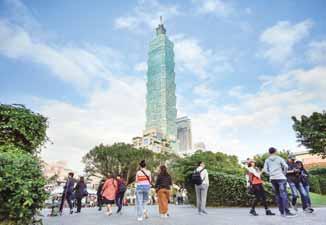
Hank Sartin
The iconic Taipei 101 tower, one of the tallest buildings in the world, is designed to evoke a stalk of bamboo, a staple of traditional Taiwanese building techniques. It’s one example of the way that in this city, innovation springs from tradition. When you’re in Taipei for the 2021 Rotary International Convention from June 12 to 16, 2021, you’ll find historic and modern architecture, urban and natural settings, lively nightlife and serene spirituality. You can visit tea houses that honour centuries-old customs and enjoy fusion cuisine that embraces the influences of China, Japan, the Netherlands, Portugal and Spain. And everywhere you go, you will be sure of a friendly welcome.
For some Rotarians, this will be a chance to revisit Taipei, which played host to the 1994 convention. Whether this is a return visit or your first time here, you will find much to explore: Awe-inspiring palaces and temples, engaging museums, and lively shopping districts are all within easy reach of the city centre.
Beyond the city limits, Taiwan has even more to offer, from the pastoral splendour of a ride on the Alishan Forest Railway to the ornate beauty of the Tianliao Stone Temple, built of seashells, corals and stones.
Learn more and register at convention.rotary.org.
K R Ravindran Foundation Trustee Chair
Steve Jobs has said, “We are here to put a dent in the universe. Otherwise, why else even be here?”
There once was a man who had a vision. He had a dream to make a dent to change the way to serve humanity. He had a plan with farsightedness; he had persistence; he had absolute faith in his conviction. He knew how to build the founding pillars to make his dream a reality. He was Sir Clem Renouf, the innovator of “Health, Hunger, Humanity (3-H)”, the author of the first chapter of the polio-free world story.
Clem moved the Rotary world and yet he was humility personified. In his acceptance speech on being elected RI President for 1978–79 at the 1977 San Francisco Convention, he said he was there “because Rotary takes ordinary
men and gives them extraordinary opportunities to do more with their lives than they could ever dream possible.” In fact, Clem was an extraordinary man in his apparent ordinariness.
I am very fortunate that significant part of my Rotary journey was linked with Clem. He was the incoming RI President at the1978 International Assembly at Boca Raton, Florida, US, and I was a first-time Group Discussion Leader (now known as IA Training Leader). This is where he declared his theme “Reach Out” and exhorted Rotarians to do so, with an open hand, open mind and open heart. I was inspired.
Immediately after, at the 1978 Tokyo Convention, he gave his address and announced the 3-H programme, giving full credit to the then President Jack Davis. I had my maiden presentation


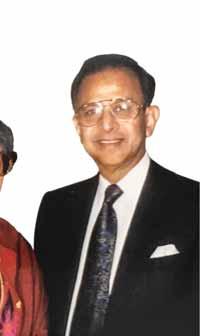

at the convention and was speaking on ‘Voices of Asia’. I was the youngest panellist, both in age and Rotary position. I suppose my presentation brought me in personal contact with Clem, thanks to President Jack Davis who opened this door of opportunity.
The day Jim Bomar was formally elected RI President for 1979–80, we had a small get-together. I approached Bomar and congratulated him, wishing him a great year. He thanked me but quickly added, “Raja, my first responsibility is to make Clem’s year the greatest year”, and Clem was nowhere in hearing distance. A profound message that I have absorbed in my mind, and acted in conduct.
In 1979, I was again invited as an International Assembly training leader, where formally the 3-H programme was launched. We, the discussion/training leaders, were fully oriented to explain the concept of the new programme, 3-H. I remember I went in one group of incoming governors and I saw a message on a poster written by them, “Do you see the blood on the floor?” I asked about it and was told that the discussion leader in the previous session was murdered with questions on 3-H. With nervousness in mind, but with a confident face, I said, “We will together clean up the blood.” Thereafter it was smooth sailing.
3-H was conceived with vision, planned with detailed articulation, and became a perfect fertile ground for the seed of polio eradication to successfully germinate. In April, 1979 on a flight,
Clem picked up a copy of Readers Digest and there he read the story of smallpox eradication. He started thinking, could Rotary eradicate another disease from the face of the earth. Reaching Chicago, he immediately contacted his District Governor, John Sever, the Head of Infectious Diseases, at the National Institute of Health, US.
Within a week came his answer, “Polio”. Dr John Sever’s recommendation came to the RI Board, of which I was a member and “Polio 2005” was approved which ultimately became “PolioPlus”. This period of 1981–83, was a battle between the powerful voices of past Rotary leaders who did not want the change, and contemporary Rotary leaders who were totally convinced of the new concept. The Board’s decision was challenged by a group led by Past RI President Jim Conway in an appeal at the 1982 Convention in Dallas.
I was there to witness a drama and never have I seen that past presidents were defeated by thousands of voices. Snubbed, the opposition leaders, including PRIP Conway, took the matter to the Council on Legislation at Monaco in 1983 to defeat the proposal of allocation to 3-H by The Rotary Foundation. I was on the Board — each Board member was assigned to talk to likely opponents to get them over to our side. I talked to a very senior Rotary leader, Jules Flock from Cleve land, US, who had come to my district conference during my governorship. He did not relent and I had to rebut. The proposal got through squarely and that was the sunset of the past philosophy which may have had validity till then. The time had come to open doors for corporate projects ushering new dimensions. To me, this was the milestone change to Rotary — a new sunrise. This enabled Rotary to take up polio eradication and come up on the world stage.

On a personal note, I recall that at the 1981 Sao Paulo Convention, when one evening the carnival was on the stage and people were dancing, Clem took me aside and said, “Raja, I congratulate you for coming in as a RI Director but I congratulate you even more for having Usha as a wife who is not pushy at all. Such people do spoil their career.” Quite an observation! He visited Chandigarh in 1998 and whenever Usha and I visited Australia, we always visited the Renoufs, with our very close friend for five decades, Glen Kinross.
In 2008 we were with Clem and Firth at their home. I saw with Firth a collection of theme pins of all RI Presidents and she said, “Raja, I don’t have yours.” I immediately gave one to her. Usha wanted flower seeds and they drove us to a supermarket and got what she wanted. Our last meeting was on May 25, 2014, when Clem and Glen were honoured by their District 9600, and dedicated historical records of the two Rotary stalwarts, located in an appropriate place.
We all knew how much he loved his wife June and when just after 8–9 months of her demise, he married again, we were somewhat surprised. Clem had guessed such a reaction. He wrote to me as he did to others — a letter
I considered a masterpiece. In essence, he wrote that he had not stopped loving June. He had been living in a unit, adjacent to which lived Ted and Firth Coats, who became their close friends, as they shared common interests. Ted, unfortunately died soon, leaving two grieving individuals. That brought him and Firth together for companionship and they got married in September 1994.
Receiving that letter we felt it was a very logical action and he rose further in my esteem. Firth was totally innocent of Rotary but soon after the marriage, picked up Rotary knowledge and became an ardent partner in Clem’s Rotary life. Clem had said that he loved and adored his parents. Though they were under enormous financial pressure following the 1930s’ depression, they were resolute to give best education to their six children beyond their home city. Clem said that in his case, extra money was paid for getting extra subject — Art of Speech. This, he said, was the foundation of his public speaking.
Clem was my role model. He was a mentor, friend, philosopher and guide. Clem has been the complete Rotarian, the complete human being. He is a gift to the generations of Rotary.
The writer is a past president of Rotary International
K R Ravindran
In the passing of Clem Renouf, Rotary has lost one of its senior statesmen, and one of its most respected leaders. The younger generation of Rotary may not be as familiar with him as others but he was a giant in Rotary in his own right.
Clem was 99 when he died and his wife Firth is just over 100. In 1978, when I was a 26-year-old member of my

club and serving as its bulletin editor, Park Nadesan, a senior past governor and member of my club, RC Colombo, was the chairman of our District Conference. Park was a brilliant orator with a stentorian voice, a former secretary to the Prime Minister of Sri Lanka, a top civil servant and generally well respected.
He told me that the chief guest for our conference was RI President Clem Renouf
himself and asked me to interview him in his hotel for our club magazine. Not able to say no to Park, I agreed.
Interviewing an RI President at 26! It did not occur to me then that being offered an opportunity to interview an RI President was a big deal and I agreed to do my job in a rather perfunctory manner.


I have to say that I was pleasantly surprised to be confronted with a genial and a pleasant person who showed a young lad (with long hair) so much courtesy and kindness and actually helped me to do my job!
But I had no contact with him till 1994 when I ran into him again quite accidentally at the departure lounge in Brisbane airport. By then
PRIP K R Ravindran with PRIP Clem Renouf and his wife Firth.


I was knowledgeable enough in Rotary to know Clem Renouf was a part of Rotary folklore and I did not want to miss the opportunity to talk to him.
During our conversation, I invited him and Firth to Sri Lanka. They not only came over but spent several days with Vanathy and me in our family plantation in the mountains and we became close friends.
A fascinating storyteller
Clem was a fascinating storyteller and during their stay, he had me enthralled talking about the many challenges he had to encounter when he was President. His birth date, incidentally, was the same as that of Paul Harris.
Firth was his second wife; he married her after his wife June died. It was a match made up by their respective children, after both of them had lost their spouses. They had lived next door to each other.
There is a beautiful letter he wrote to all his close friends, including PRIP Raja Saboo, explaining why he chose to marry again after losing his beloved June and he published this letter in his book One Man’s Journey. It turned out to be a good decision because Firth and Clem were not only a couple but also great friends.
When I went to see him in the late nineties, he was there at the Brisbane airport to meet me and drive me back to his house — a beautiful home literally overhanging into a river. He told me I was the first guest in his new house. Interestingly, there was only one Rotary photograph in the guest bedroom and it was one of him with the Prime Minister of India at a garden party in Delhi.
On a subsequent visit I found that they had sold that home and had moved into a smaller home in a secured village. I visited him again in 2012. By then his hearing had dropped but his wit and spirit remained the same. We went out for lunch, joined by another
TheHealth, Hunger, and Humanity programme of RI (3H) was the brainchild of Sir Clem Renouf in 1978–79. But I’ll leave that story to be related first hand by PRIP Saboo, who had a ringside seat. It’s a story worth listening to and having knowledge of. It’s one of the stories that transformed Rotary to what it is today — with the ability to take on the eradication of a disease. If not for Clem Renouf, we would probably not have the PolioPlus programme. He was an accountant. But he was also a pilot who flew combat missions in World War II, based out of Malaysia. He spoke of a time when he had to personally visit the mother of his best friend Don Campbell to tell her that her son had died. (He had died on an aircraft beside him on a mission.) But she would not believe

him and instead clung desperately to the hope that her son would return.
Clem clocked 1690 combat hours of flying before he retired from the air force at the age of 24. He was invited to Rotary because the other accountant in the town — Jasper Bentley declined the invitation. So he always used to say he was a second choice Rotarian! Nominated to serve as a President of Rotary International in 1978, his theme was Reach Out. He wanted a theme which reflected his personality, and which could be translated into action. He used to say ‘You cannot reach out with your hands in your pocket’!
KRR
legendary Aussie — Brian Knowles and spouse, and Clem regaled us with his stories.
My last visit to Australia in Nov 2019 was the last time I saw him, this time in a retirement home and looking very frail. He presented me with a signed copy of his book and I did not have the heart to tell him that he had already given me a copy of that book.
Firth was also there and she told us that at 101 years, she still drives although her insurance costs a lot!
In 1988 he was conferred knighthood by the Queen and he became Sir Clement William Bailey Renouf.
Clem was a person who had extravagant charm, intense generosity, a sharp wit, genuine humour, and a whole-souled view of leadership.
We should celebrate Clem’s life and not mourn his passing. Good Night Sir Clem, thank you for the memories.
The writer is a past president of Rotary International.









TRasheeda Bhagat




he kind of influence that Rotarians can wield on their government, thanks to the work they have done in the past in critical areas such as disease prevention and health care, water and sanitation, etc, can be clearly seen from the way the Sri Lankan government reached out to the country’s Rotarians, and their robust response, during the first phase of the corona pandemic.











This was amply evident in the speech made by PRIP and incoming Trustee Chair K R Ravindran at the opening session of RI’s Virtual Convention.



He said that as the pandemic began, “my country (Sri Lanka) reacted proactively and very quickly. After we had only one case, the government held its first structured meeting to discuss the problem. Rotary was invited to the table along with WHO, UNICEF, World Bank and others.”



Incidentally, Rotary was the only service organisation at the meeting, he said.





Sri Lankan Rotarians put their heads together and assessed the short term and long term steps Rotary could take to help their country respond to the pandemic. “We recognised right away that the hottest commodity on demand would be the PPEs (personal protective equipment). We were correct, and demand for protective equipment rose at an astronomical pace.”
Sri Lanka produces apparel for some of the world’s best-known fashion brands; Rotarians met with some of these manufacturers and suggested that they switch production lines to make masks and other protective equipment, and got a positive response. The result is that today Sri Lanka is a major exporter of PPEs.
Next, even as they planned large Covid relief projects, they took on



smaller projects such as upgrading the software and hardware of the government’s health promotion bureau, so that it could get out safety messaging in social media more efficiently.

technicians to remain safe as they did this testing.



The Rotarians also took on the challenge to upgrade the country’s principal research lab, which handled Covid-19 testing, as this would become a critical facility in the coming days. But it required a major investment, as they wanted it to be “world class; Rotarians and friends responded generously and unhesitatingly, and in 10 days we raised close to $1 million, including $200,000 from TRF. The Foundation staff reviewed and cleared a global grant application in 48 hours. It was the fastest global grant authorisation I have ever seen.”
With the new, fully automated equipment, Sri Lanka’s Rotarians helped not only to cut the testing time for the Covid-19 virus from 8 to 2 hours, but also enabled the lab

Ravindran added that in the future, this upgraded lab will not only help the country to deal with the corona virus, but other illnesses, viruses, and outbreaks. This way, Rotary in Sri Lanka has established a significant landmark in the country’s response to handling the pandemic.
(According to the figures available on June 22, Sri Lanka has seen 1,950 confirmed cases, of which 1,498 people have already recovered and the country has registered only 11 deaths.)
Significantly, added Ravindran, Rotarians did not stop with these projects to help their country combat the pandemic. They also looked at life once the lockdown had ended and radical behavioural changes would need to be enforced to ensure people remained safe from infection.
So another project, in which all the clubs in Sri Lanka are involved,




Rotarians at RC Udupi Manipal, RID 3181, were delighted to see videos sent by some of the beneficiaries of the LN-4 prosthetic hand fitment camp who had resumed normal activity after returning home. The two-day camp was organised by the club with the support of RC Poona Downtown. Around 300 amputees got a new functional hand, said Project Chair Dr A Girija.
Manipal Academy of Higher Education provided their hospital premises for the camp. Pradeep Munnot from RC Poona Downtown who had conducted more than 50 such camps with his team trained the volunteers.

is titled Stop the Spread. “Working with experts and professionals, Rotary has set up a protocol that would enable companies who are compliant with such guidelines to be certified as a Covid-controlled environment. Thus, across our country, industries, business premises, educational institutions, supermarkets, and other retailers can make their establishments safe, both for themselves and their customers.”
This is a long-term, sustainable and much needed project that will help people to deal with the new normal. “With all these projects, Rotary has shown that we are living up to our promise and reputation as People of Action”, with the firm belief that “every situation in life is temporary and nothing lasts forever. So we will endure, and the essence of Rotary will always keep us together in spirit, side by side, until we are ready to physically meet again,” he concluded.



















Rotary Club of Herzogtum
Lauenburg-Mölln
Germany
President
Shekhar Mehta
Rotary Club of CalcuttaMahanagar, West Bengal India
President-elect
Johrita Solari
Rotary Club of Anaheim California, USA
Vice President
Bharat S Pandya
Rotary Club of Borivli Maharashtra, India
Treasurer
James Anthony “Tony” Black
Rotary Club of Dunoon Argyll, Scotland
Mário César Martins de Camargo
Rotary Club of Santo André, São Paulo, Brazil
Virpi Honkala
Rotary Club of Raahe Finland






Susan C Howe
Rotary Club of Space Center (Houston), Texas USA


Jan Lucas Ket
Rotary Club of Purmerend, Netherlands

Kyun Kim
Rotary Club of BusanDongrae, Busan, Korea

Aikaterini KotsaliPapadimitriou
Rotary Club of Pendeli Greece
Peter R Kyle
Rotary Club of Capitol Hill (Washington, DC) District of Columbia USA
Floyd A Lancia
Rotary Club of Anthony Wayne (Fort Wayne) Indiana, USA



Roger Lhors
Rotary Club of PontAudemer, Eure, France
Chi-Tien Liu
Rotary Club of Yangmei Taiwan
Kamal Sanghvi
Rotary Club of Dhanbad Jharkhand, India
Katsuhiko Tatsuno
Rotary Club of TokyoWest, Tokyo, Japan
Stephanie A Urchick
Rotary Club of McMurray, Pennsylvania USA
Valarie K. Wafer
Rotary Club of Collingwood-South Georgian Bay, Ontario Canada
John Hewko
Rotary Club of Kyiv Ukraine
General Secretary






K R Ravindran
Rotary Club of Colombo
Western Province
Sri Lanka
Chair
John F Germ
Rotary Club of Chattanooga, Tennessee USA
Chair-elect
Michael F Webb
Rotary Club of Mendip Somerset, England
Vice Chair
Jorge Aufranc
Rotary Club of Guatemala Sur Guatemala
Brenda Cressey
Rotary Club of Paso Robles, California, USA




Per Høyen
Rotary Club of Aarup Denmark

Barry Rassin
Rotary Club of East Nassau, Bahamas
Jennifer E Jones
Rotary Club of WindsorRoseland, Ontario Canada
Hsiu-Ming Lin
Rotary Club of Taipei Tungteh, Taiwan


Ian H S Riseley
Rotary Club of Sandringham, Victoria Australia
Gulam A Vahanvaty
Rotary Club of Bombay Maharashtra, India
Geeta K Manek
Rotary Club of Muthaiga
Kenya

Sangkoo Yun
Rotary Club of Sae Hanyang, Seoul, Korea
Hipólito Sérgio Ferreira
Rotary Club of ContagemCidade Industrial, Minas Gerais, Brazil

Aziz Memon
Rotary Club of Karachi Pakistan

John Hewko
Rotary Club of Kyiv Ukraine
General Secretary
Rasheeda Bhagat
In an era where the corona pandemic has compelled the government to look for virtual/ electronic mediums to ensure India’s children keep learning and stay connected to their curriculum, novel and innovative ways are constantly being explored to engage them in learning, Union HRD Minister Ramesh Pokhriyal Nishank said, addressing a virtual meeting.
The occasion was a landmark partnership between Rotary India and the NCERT (National Council of Educational Research and Training) and the signing of an MoU between the two to provide electronic learning content for students of classes 1–12. This content is now already available in English, Hindi and Punjabi and “we are giving NCERT the rights to translate it in all other Indian languages to reach a much higher number of students,” says RIPN Shekhar Mehta.
Nishank said this MoU had come at a very critical time for the HRD ministry as there are areas in India where there is no internet or mobile connectivity, or access to mobile phones. “So we have resolved to reach our students through radio and TV and this MoU is a big step in that direction to reach quality education to our students more effectively.” He particularly laid stress on the quality of the e-learning content developed by Rotary.
It was explained during the meeting that as part of this partnership, curriculum modules will be telecast for classes 1–12, through 12 national television channels of NCERT, to be available from July 2020.
The Minister said that from March, when Covid-19 was declared a pandemic, “learners, teachers, parents and the
entire education community have been gravely affected. The HRD has been working tirelessly to develop the best education system rooted in Indian ethos with technology and innovation as strong pillars.”
Education, he added, is “the backbone of any country,” and to take India back to its glorious past when it was the leader in cultural and educational ethos, the GoI was looking for partners such as Rotary, he added.
Participating in the Zoom meet, Education Secretary Anita Karwal said she was surprised to see the passion and commitment for education and literacy displayed by the Rotarians she had discussed this partnership with. She appealed to Rotary to similarly help the HRD Minister to fulfil
the learning needs of special children. On the spot, Mehta gave the commitment that Rotary would do this straightaway.
Sharing with the minister and the NCERT officers Rotary’s passion to see a totally literate India… “a Shikshit Bharat”, by 2025, Mehta said Indian Rotarians had embraced the mission to do so for the last eight years. “We want to do something concrete for India’s children and our mission is to ensure that no child is denied education,” he said.
The software it had developed over the last five years through relentless work and strategic partnerships was now being given



to the nation through the NCERT free of cost, so that it could be used as a homebased teaching solution during this pandemic and beyond. “Rotary has a vast experience in e-learning, having installed e-learning software/hardware to over 30,000 government schools across India in the last five years,” he added.
After Rotary had developed e-learning kits, which really captured the children’s imagination, and distributed these to so many schools across India, particularly in Maharashtra, children were saying they “want to go to a projector-wala school, meaning they want to learn through the audio-video medium”.
Similarly Rotary had approached channels such as Animal Planet and

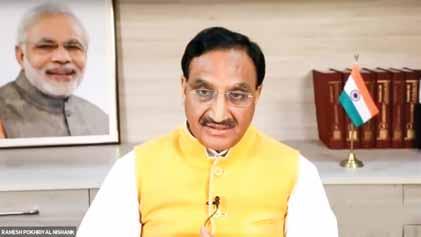
Discovery to share with them some of its interesting videos on the animal kingdom. “So many children in these schools cannot subscribe to these channels, so we have got those videos and included them in the electronic content, so that these children are not deprived of this exciting component of learning.”
Explaining the five verticals in the Literacy programme with the acronym TEACH, Mehta said that as teachers form the backbone of the education system, Teachers’ training was a big component of Rotary’s literacy programme. And to motivate them to be more involved in their work, outstanding teachers were being recognised by Rotary through awards.
Explaining the reach and scope of the literacy programme, the RIPN said that along with the Rotaractors, Rotary’s youth wing, community service in India was being
Union HRD Minister Ramesh Pokhriyal Nishank.
rendered “through three lakh families. Add to this our partners, such as the Brahmakumaris, corporates and others who work with us, we have the capability to work alongside the GoI and the State governments and make a difference. In other avenues of service, we Rotarians have decided to do 10 per cent of the work the government does, but in Literacy, we commit to do 50 per cent of your work. Through our Asha Kiran programme, this year we have sent back to school 60,000 children.”
One of the components of the literacy programme was adult literacy; India’s literacy rate was 74 per cent and there were 27 crore adult illiterates in India. If children and others could be involved in making these people functionally literate, we could make a good dent on our illiteracy, Mehta added.
The MoU between NCERT and Rotary India was signed by NCERT
Prof Hrushikesh Senapaty and PDG Ranjan Dhingra. While Secretary Anita said she was pleasantly surprised that Rotary could give the government such excellent e-learning content in such a short time, Senapaty said it would be excellent to telecast for those children who had no connectivity or smart phones.
PRIP Kalyan Banerjee said Rotarians in India had been working in literacy for the last 10 years and would continue to work with the government. RI Director Kamal Sanghvi said Rotary had worked very hard to develop this software, and “the signing of this MoU brings us so much satisfaction, as this is the sweet fruit we are getting after so many years of hard work.”
PRID Ashok Mahajan said Rotarians were aware how important it was for the GoI to eradicate illiteracy; “we promise to work along with you and we will not disappoint you.”
V Muthukumaran
We are ready to partner with GoI in nation building, especially in the healthcare and education sectors,” said RIPN Shekhar Mehta, in a virtual meet with G Kishan Reddy, Union Minister of State for Home, and updated him with Rotary’s plans and goals for healthcare, literacy and the Covid-relief activities by Rotary India.
He said Rotary has come out with a Disaster Management Plan by identifying seismic zones and floodprone areas in India. “We are ready to provide 10,000 shelter kits, each containing 52 utility items for disaster victims, to the government in its rescue efforts during natural calamities. Besides, there are around 200 Rotarian doctors willing to assist you in relief work,” he added. Apart from relief work, Rotary has taken up a number of rehab programmes for disaster victims in Kerala (target: 1,000 homes), West Bengal (100 houses) and Andaman and Nicobar Islands (500 houses).
The minister in turn spoke about the government’s proactive steps in combating the Covid-19 pandemic. Spelling out the government’s efforts to help migrants, caught in the pandemic, he said it had set aside ` 61,000 crore for providing jobs to migrant and temporary workers under the MNREGA in April budget which was followed up with another `40,000 crore under the Atmanirbhar Bharat package. “In all, a total of `1.1 lakh crore is being disbursed to the States for creating rural jobs,” he said.
Calling for a united front pandemic fight, Reddy said the Centre has earmarked `14,000 crore
to States for providing food to migrant labourers.
With record production, there is no shortage of food supplies and food procurement is on with favourable MSP (minimum support prices) for farmers. The GoI has announced free supply of food grains to poor families for five months, raised the loan ceiling from `10 to `20 lakh for women SHGs, offered a slew of economic support to farmers, and credited `1,500 each in the Jan Dhan accounts.
Under Atmanirbhar Bharat, the rural and urban economies are being revived with agri-support to farmers to produce and market their crops, offering concessional loans to MSMEs, street vendors and small shops in urban areas for working capital.
The government has put in place a ‘robust disaster management framework’ to withstand the Covid shock initially, take prompt decisions and ensured proactive steps to contain the pandemic. “PM Modi declared Covid as a national disaster and the comprehensive National Disaster Management laws were invoked to deal adequately with the situation,” and our ‘rapid response’ was acknowledged by the WHO.
India, as a partner-member of Shanghai Cooperation Organisation (SCO), is involved in taking a series of mitigation efforts to tackle national calamities, said Reddy. “Amid the pandemic, we are also dealing with cyclone havoc in Bengal and Odisha

where the rapid response teams have taken pre-emptive steps to avoid casualties.” Going forward, the mantra will be ‘rapid action, prevention and coordination’ and the GoI is taking all steps including the Covid Update and Aarogya Setu App by leveraging technology to contain the pandemic, he added.
Till March 15, not a single Indian firm produced either a PPE kit or an N-95 mask, and they were imported. “But now 500 start-ups make 4.9 lakh PPE kits per day, thanks to the war-footing efforts of the government. Before the Covid outbreak, there was only one testing lab in Pune and now 784 labs have been set up in the country and their personnel trained online,” Reddy said.
At present, there are 958 Covid hospitals with 4.53 lakh beds in ready mode to admit patients and ventilators are being made in India now to meet the requirements. “India has exported hydroxychloroquine (HCQ) to 54 countries with free shipments to poor nations. WHO has endorsed the usage of HCQ tablets after initial hesitation with persuasion from India.”
RID Kamal Sanghvi, RIDN A S Venkatesh, Trustee Gulam Vahanvaty and PDG Kishore K Cherukumalli spoke at the webinar attended by 1,500 Rotarians from India, Pakistan, Sri Lanka, Nepal and Bangladesh.
Appreciating the work done by Rotarians in India during the corona pandemic and responding to RIPN Shekhar Mehta’s statement that Rotary in India had contributed in cash and kind to the tune of `200 crore, Union Information and Technology Minister Ravi Shankar Prasad, in a Zoom meeting, urged Rotarians “to work with the GoI for the good of our country.”
When RID Kamal Sanghvi asked him to spell out his vision for Digital India, Prasad urged Rotarians to get involved in the ‘digital village’ initiative of the GoI. “We are going to give villages access to the internet and sign them up for literacy programmes, government schemes, job opportunities, and much more. Should you choose to partner, then these villages could become Rotary Digital Villages.” He also asked, “Can each Rotary club in your district make five lakh digitally literate students who know what is an email, how to use WhatsApp, how to obtain government services through apps?”
He added that “government schools need handholding. The country’s mindset towards these schools needs to change. You must work towards bridging the gap.” Mehta explained Rotary’s “Happy School initiative, which has upgraded the infrastructure and co-scholastic facilities in State-funded schools and made them secure, attractive, and happy learning places for lakhs of students and thousands of teachers.
Saying that today’s students were different, the Union minister added, “You and I have read about the solar eclipse from a black and white textbook. But today, students want to experience a solar eclipse, see it with their eyes rather than read about it. Only when we upgrade the learning experience by making it equal for students in both private and government schools, we will be able to bridge the digital divide.”
Kiran Zehra
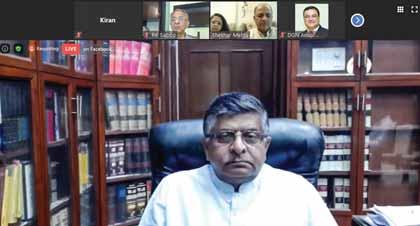
Union Information and Technology Minister Ravi Shankar Prasad in a Zoom meeting with Rotarians.
Prasad pointed out that India heads the global IT backend operations, and “while the whole world wondered kaam kaise karen, Indians are doing 85 per cent of the global work from their homes. This is the beginning of a new world. We will have to learn to live in it and I seek your support in this digital transformation of India.”
He added that the government runs Common Service Centres (CSC) which is a digital kiosk. Among the many things, this kiosk does its works as a platform for tribal students to find a job and runs a Digital Literacy Programme. “Every gram panchayat has a CSC. I request Rotarians to become patrons of these CSCs and help the women who use the CSC for tele-health consultations. While earning a living these women are transforming the lives of their families and the people around them.” Mehta promised to do so.
Talking about digital healthcare being the next big thing in the country, Prasad asked “Can Rotary think of bringing together a panel of doctors,
for this virtual healthcare initiative? I know there is a challenge — without checking the pulse how can we prescribe a pill? But together we can overcome this and create a plan to see how we can help people who have little or no access to healthcare at all. ”
Mehta responded: “We have hundreds of doctors who are Rotarians, the Vice-President of the Indian Medical Association is a Rotarian, I am sure we can work on it.”
The RIPN agreed to do so and gave the minister a heads-up on Rotary’s adult literacy programme, and said it cost only `100 to make an adult literate. “We request you to waive off the postal charges of `10 that we pay to send the adult literacy books to far-off parts of the country.” Agreeing to do so, the minister said “along with the waiver we will also look into printing a commemorative stamp to celebrate 100 years of Rotary in India.”
PRID Manoj Desai moderated the Q&A session and RIDN A S Venkatesh expressed gratitude.
V Muthukumaran
In a path-breaking initiative paving the way for pan-India collaborations, Rotary India and Lions International will be doing a three-month joint pilot project in Kolkata from July. This was announced jointly by Shekhar Mehta and Past Lions International Director Arvinder Pal Singh at a webinar on ‘Synergy to Serve’.
Mehta proposed a 10-member steering committee, five each from Rotary and Lions, to handhold the project that can focus on any of the eight verticals — Literacy, Water, Sanitation, Health, Conflict Prevention, Environment, Disaster Management and CSR activities. “Further modalities will be worked out at the next virtual meeting. This budding partnership will lead to a marriage of two important entities — Rotary and Lions,” he said.
The joint project between the two largest service organisations would be a fitting tribute to Mehta’s parents who were active Lions and served the physically-challenged and other weaker sections of society, said Singh. “We will approach the joint project with an open heart, mindset and ready acceptance.”
When quizzed by PLID Sangeeta Jatia, the moderator, on Rotary getting its topmost executive, RI President, from a Lion’s family, Mehta replied, “before a Lion got me, a Rotarian influenced me to join his club. My father was an active Lion then, but he did not insist that I should join a Lions club only.”
Is there an inbuilt animosity between Rotary and Lions as both of them are headquartered in Chicago, US, and have journeyed through similar community projects, programmes and membership
profile, mostly businessmen, asked Sangeeta. “I have huge respect for Lions as they too are serving humanity. Recently, four largest service organisations came together to give a joint call for a united front in these challenging times. Of course, we can have a healthy competition in executing community projects,” said Mehta.
There is absolutely no rivalry between the top leadership of both NGOs, said Singh, adding that “at the membership-level, there may be little differences or clashes over the issue of attracting the best talent in doing humanitarian services. But this is quite natural.” But both service organisations can think of “pooling our core competencies and leveraging our strengths for doing maximum good.”
Singh called for Rotary and Lions to explore the possibilities of “crossfunding of projects and a mechanism for service collaboration.” Sangeeta said that a joint virtual platform should be created for sharing best ideas and practices. “We stole Mehta’s pet project of heart surgeries and hence, a virtual conclave to share best projects will be useful for both,” she said.
During his term as Rotary President (2021–22), Mehta said the RI Board would have nine women out of 17 members. “Women will occupy 40 per cent of Rotary leadership and we are working to increase women’s membership from the present 20 per cent to at least 40 per cent in the next few years as I strongly believe that women are more sincere in their work and that bodes well for Rotary.”



Mehta invited Lions to Chhoti Si Asha, a `200 crore virtual fundraiser for disadvantaged children organised by RC Bombay, RID 3141, and Wizcraft on June 28. The three-hour virtual programme will raise money for Covidrelief and long-term projects for vulnerable children in areas of nutrition, health, education and skill development. Lions too have done Covid relief projects worth `100 crore across the country. In eastern India alone, “we would have delivered three million meals to the needy and have donated PPE kits and other material worth `76 lakh in Punjab,” said Singh. But he called for holding awareness programmes on “the need for lifestyle changes for we have to be catalysts in society. Post-Covid, we need to change our project delivery and services too as social distancing is here to stay.”
In a changing lifestyle ushered in by the pandemic, Mehta said, “we all need to be tech-savvy as social norms such as work from home and online education will become part of our routine. We will take up digital literacy as one of our joint projects.” Summing up the virtual meet, he suggested that “families of Rotarians and Lions send their children to attend each other’s events to sow the seeds of friendship and cordiality.” Over 500 Rotarians and Lions from India, Pakistan, Sri Lanka, Bangladesh and Nepal took part in the virtual meet hosted by Lions Club of Kolkata Mother Teresa Sarani.
Senior Rotary leaders participated in a two-hour telethon organised by NDTV in collaboration with the Médecins Sans Frontières (Doctors without Borders - MSF), an independent medical organisation, to protect medical staff in their fight against Covid-19. RIPN Shekhar Mehta announced a donation of ` 70 lakh worth of equipment for MSF on the #UniteWithoutBorders telethon, saying, “Rotary has already provided over one crore masks and one lakh PPEs and is willing to provide MSF with oxygen concentrators, PPEs, etc.” To commemorate Doctors’ Day, he suggested that we send “each doctor and medical caregiver a message of gratitude. This will encourage them.”
Over ` 1.2 crore was raised for the protection of medical caregivers at the end of the two-hour telethon with Rotary being the largest donor.
Rince Joseph, President of the United Nurses Association, Delhi, said that they have approached the Supreme Court with an appeal for quarantine facility for healthcare workers. “They become potential carriers of the virus, putting their families at risk. So, we need to provide, especially the nurses, a quarantine facility.” He also discussed the importance of all medical caregivers having access to PPE kits. “The PPE kits we are getting are not of the best quality. Many healthcare workers have to be in quarantine for 15 days in a month and they get half their salary, which is very difficult for them. We need to protect healthcare workers,” he urged.
Kiran Zehra

RID Dr Bharat Pandya said it was important to understand that in medical science, “the outcome for treatment may not always be the same... and answers may differ from patient to patient. We have to remove the stigma around Covid infections and need to treat our healthcare workers with respect and protect them.” Echoing
the thoughts of Pandya, PDG Dr Bal Inamdar (RID 3141) who was also part of the telethon said, “Covid has created a new class of untouchables — the private medical practitioners. People are scared to go to doctors for fear of contracting the virus.” People with other health issues must visit doctors; they can go to non-Covid hospitals or consult their general physician, he said.
We have to remove the stigma around Covid infections and need to treat our healthcare workers with respect and protect them.
Bharat
Pandya RI Director.
Pointing out to the surge in Covid-19 cases in Bihar due to the return of migrant workers RID Kamal Sanghvi said, “MSF is creating Covid treatment facilities in the State to treat critical cases. Rotary will help MSF with PPEs, ventilators... anything they need.” He reminded that “it is not just NGOs and service organisations; it is also the responsibility of every citizen to fight this pandemic.”
The telethon ended with Hymn of Hope composed and performed by singer-composer Raghu Dixit.
V Muthukumaran
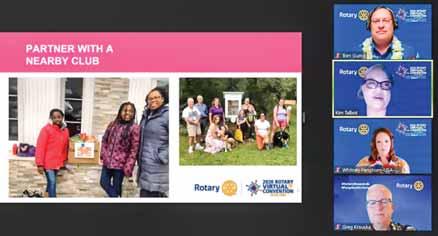
One sure way to increase Rotary membership and ensure retention is to induct young families and involve them in service projects. But for that we have to change the club format by adopting flexible meeting time, shifting the location to less-costly venues like parks and restaurants and include weekly sessions with a variety of programmes including picnics to woo young professionals and students: These were the views expressed by the four panellists at a breakout session on ‘Engage your families with service and alternative meetings’ at the RI Virtual Convention.
Speaking on alternative ways to make club meetings and projects appealing to young families, DGE Tom Gump from RC Edina Morningside, RID 5950, US, said, “we need to explore options of holding club meetings at night, and at places like parks or bars for young professionals to attend” without missing their work. Let us consider a less-structured meeting to involve families and professionals,
he said, calling for instilling in young Rotarians sense of involvement.
Rtn Greg Krauska, RC Chanhassen, RID 5950, Minnesota, US, said clubs should allow “young people to design service projects and that means getting more involved with Interactors and Rotaractors.” Clubs must reach out and “collaborate with communities to attract families whose first conversation with Rotary must be easy and memorable.” He recalled his experience of teaching his daughter the school syllabus and finding that Rotary had made him a better parent. Rotary must become a part of social identity for the communities because “when we belong to a positive, vibrant group, we thrive.”
The five whys Rotary is a gift that allows members to live their ‘whys of life’, said Krauska, and listed five time-tested values such as tradition – we are part of a great legacy; relevance – what we do has meaning; identity – we are part of distinct group; belonging – we belong to
a group upholding high standards; and effectiveness – we are capable of success, all of which can be showcased to woo families and young people.
Clubs must explain the opportunities and benefits of Rotary membership to families looking for social cohesion and identity to create an impact in community service, he said. In her speech, Kim Talbot, Membership Chair, RC Scotia, RID 4943, US, said families bring with them energy and growth, which will enable clubs to expand social connections, mobilise resources and foster generation of novel ideas. “Club meetings and fellowship can be made kid-friendly, and we can partner with nearby clubs” to extend this programme, said Kim.
Whitney Pangburn from RC Scotia, who moderated the session, said clubs must position themselves as platforms for families to have ‘quality time’ and community bonding. Rotary clubs have to mentor Interact and Rotaract clubs in schools and colleges to attract youth.
During the Q&A session, Krauska said the Covid outbreak has opened up an opportunity for clubs to be more relevant than ever before. “Of course, we have to wear masks and keep social distancing.”
Kim said her club is involving Interactors in service projects. Gump said apart from availing the $25,000 Covid grants for projects, his club is into door delivery of meals and shopping for families who need this service.
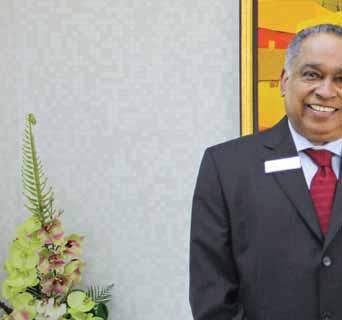


In the passing away of PRID P C Thomas, we have lost one of the most illustrious personalities in Rotary in India, as well as a humanist.
He will be remembered best for setting up an excellent educational institute; a higher secondary school of international standards and cutting edge practices and facilities. Thomas had long cherished the dream to set up a school of international stature, one that would not only impart top class education to students but that would also attract qualified, committed teachers to impart knowledge to students, enrich them with the best of academic abilities, and motivation levels and facilitate their holistic growth and development. Thus, the Good Shepherd International School was established in Ootacamund, Tamilnadu.
The school is the first-of-its-kind in India and overseas with over 1,500 students drawn from more than 40 countries and is rated as one of the best international institutions in Asia.
The mission and vision of Thomas extended beyond education in schools. He chaired many forums
that focused attention on universal literacy campaigns and adult literacy programmes in many parts of the world.
Joining the Rotary Club of Nilgiris West in 1977 in RI District 3200, he distinguished himself as district governor during 1987–1988. He became the director of Rotary International from Zone 5 and 6 during 2001–2003. He played a key role in the acquisition and setting up of an expanded and modern Rotary News Trust headquarters in Chennai.
World leaders of Rotary International took his help and advice in various committees which included PolioPlus Task Force Committee, Literacy Promotion Task Force Committee, RI Redistricting Committee, and he served as training leader at the International Assembly, vice-chairman of International RYLA Committee, etc. He was a favourite choice of many RI presidents as their representative to district conferences.
A Major Donor of The Rotary Foundation, he was conferred with the prestigious Service Above Self Award by Rotary International and Distinguished Service Award by The Rotary Foundation.

The residents of Ooty remember him fondly as he was associated with the Indian Red Cross, YMCA and the Bible Society. As a Rotarian, he ensured that his business ventures supported his personal P C Thomas Foundation that he had set up for major philanthropic activities.

There is universal belief that behind every man’s vision, mission and achievements is his tremendous hard work, dedication and courage to speak out the truth which results in bringing about lasting changes. Thomas demonstrated that good deeds from a loving and caring person can make a powerful difference. I was honoured to work with him as a Rotarian.
Thomas touched the lives of not only generations of students, who have gone on to occupy influential positions throughout the world, but also so many Rotarians. They all, along with Nayantara and me, grieve with his family, his wife Elsamma Thomas and their children and grandchildren. The writer is a past RI Director. Picture by Rasheeda Bhagat
V Muthukumaran
In a major boost to restore freshwater systems in Africa, RID 9212 has entered into a partnership with UNEP for its mega Adopt-a-River Project in Kenya and Ethiopia, involving 74 Rotary clubs, said Rtn Jane Maonga
from Lavington Rotary Eco Club, Nairobi.
At one of the convention breakout sessions on ‘Adopt-a-River for Sustainable Development’ moderated by DG Joe Otin, RID 9212, Jane said this project is aimed at restoring two major rivers — the

390 km-long Athi River Basin, the second largest river in Kenya; and Akaki River in Addis Ababa. Both the freshwater systems have been polluted by human and industrial activities for decades. Divided into six clusters, the Rotary clubs are holding river walks and doing waste




audits to assess the types and sources of pollution.”
The local administration and community are being involved too. “Kenya Forestry Services is providing seedlings to plant saplings along the restored stretches of the river and recreational zones are being set up on riverbanks such as the High Rope Park in Addis Ababa and Komb Green Park, Nairobi, as part of beautification plans.” Rotary is also creating awareness among students on waste management practices, involving them in clean-up, rainwater harvesting and vegetable gardening in their communities.
A UN study has found that one-third of large rivers in Asia, Africa and America are severely impacted by pathogens. There is 30 per cent decline in freshwater systems across the world since 1970s.
National wetlands are getting depleted with increasing demands for consumption of drinking water and overexploitation of groundwater. Around 80 per cent of 159 million people who use surface waterbodies as their primary
drinking water source globally live in Sub-Saharan Africa.
Increased pollution of rivers and lakes in the last 40 years has led to decline of over 80 per cent of freshwater species. 90 per cent of all waste in the oceans comes from land-based sources being transported by freshwater systems.
Adopt-a-River Project of RID 9212 is the largest water restoration project in Africa spread over 11 counties (municipality units) in Kenya and Ethiopia.
ripar i
la l nds, p oor sanitation facilities u ur ban s in r rivers which need to be addressed t th e Rotar y c l u b s. Bes id es, t h er e
However, there are serious challenges such as high poverty levels, hostile areas with gang rivalry, human encroachment into riparian lands, poor sanitation facilities in urban areas leading to dumping of solid waste and raw sewage flow into rivers which need to be addressed by the Rotary clubs. Besides, there is laxity in the prosecution of environ-
m me nta l o ff en d ers, sa id Jane.
prevent disposal of faecal waste into rivers.
l la x i t y i n t h e p rosecut i on o f env i r o
But t h ere i s h ope w i t h t h e l o g go vernments w illi n g to en f o r w wa ste mana ge ment measures li
Sharing his views, Joakim Harlin, Head, Freshwater Unit, UNEP, said water resources are finite, but the needs and demands for consumption, industrial and commercial use are expanding rapidly.
made aware of the sources of pollution and motivated to take up river bank management like creating buffer zones and planting trees as part of restoration,” Harlin said.

But there is hope with the local governments willing to enforce waste management measures like the plastic ban. Rotary is taking up WASH projects in urban slums to
t th e p l ast i c b an. Rotary i s ta ki n g W WA SH pro j ects i n ur b an s l ums
Rotary is taking up WASH projects in urban slums to prevent disposal of faecal waste into rivers.

A steering committee with members from Rotary clubs, UNEP, private sector, government agencies and communities is implementing the project with a Trust formed to create seed money. Clubs are also mobilising resources for long-term needs. Under the Clean-up Plus initiative, training is being given to local clubs in solid waste disposal and managing litter along the rivers. “We are creating a matrix that will be fed into the assessment of pollution levels that affect the marine environment,” he said.
The project will not only be beneficial to communities, but also enhance their skill levels and enable them to replicate it at different stretches of the river, he said. “The beneficiaries are
DG Otin who is also Rotary ambassador to UNEP said Adopt-aRiver Project was conceived in 2018 when UNEP Communications Head Daniel Cooney readily agreed to work with Rotary to “increase awareness on environment and help people to understand Rotary’s initiatives to support nature.” This was followed by a visit to RID 9212 by RID Peter Kyle, and later on by then RI President Barry Rassin to mark the UN Day in Nairobi. “We selected this project in consultation with Rassin,” explained Otin.
Representing the government, Fred Nyongesa, Manager, Kenya Water Resources Authority, said the attitude of people and rapid urbanisation are destroying river ecosystems. “Besides the degradation of water catchment areas and growing pollutants are other areas of concern,” he said.
Members of Rotary Club of Chandigarh, RID 3080, have reached out to railway porters during the ongoing lockdown, providing them with groceries and food. The club undertook this project after Usha Saboo, wife of PRIP Rajendra Saboo, read about the sorry plight of these porters whose income had touched a new low due to depleted train services, says Club President Surinder Paul Kaur. The members handed over dry ration bags to the porters at the Chandigarh Railway Station, and also helped to pay their children’s school fees, new uniforms and a pair of shoes. This scholarship,
she added, is in addition to the `55 lakh spent by the club on Covid-19 relief activities.
This is the home club of PRIP Saboo; he urged club members to help those who did not possess ration or Aadhaar cards. “He pointed out that such people are not eligible for any government support and must not be left out. They required sustenance and our members contributed generously,” she said, adding that DG Jitendra Dhingra contributed 40 quintals of rice for distribution to these families.
The members also helped 4,500 families in Bapudham, where the club runs a vocational training
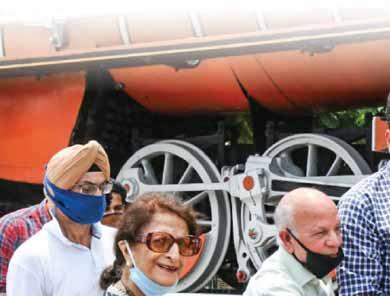
centre for women. Faidan, a village on the outskirts of Chandigarh, was sealed off after it was declared a hotspot. The local administration sought help from the club to provide 3,000 grocery kits. “We distributed atta, rice, dal, sugar, oil and masalas to each family,” she added. The distribution was done by the police under the supervision of a Rotary or Rotaract volunteer group in charge of different blocks of the village. Needy families in other areas were identified and ration bags were distributed. The Chandigarh Spinal Rehabilitation Centre was also provided with cooked meals for its 60 paraplegic patients.
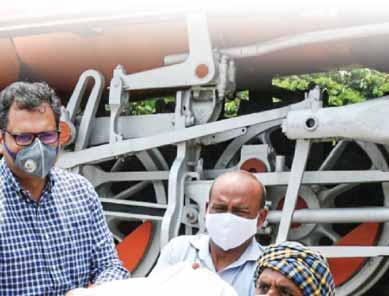


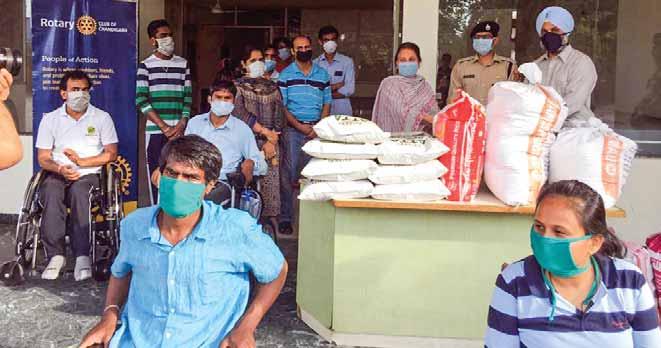
Club members at the Chandigarh
The club swung into action on the first day of the lockdown when PRIP Saboo was requested by the State Governor and some government officials seeking Rotary’s support in procuring medical and protective equipment for medical staff at the Post Graduate Institute of Medical Education and Research (PGIMER), Chandigarh. PDG Kawal Bedi helped in raising funds for the equipment. Meanwhile, Surinder received information that all the cafeterias and canteens at PGIMER were shut because of curfew. The cooks and service boys could not reach the hospital to serve the doctors working there. “We approached the Gurdwara Sahib at PGIMER which was within the hospital campus and they agreed to cook the meals.” The club provided groceries and 500 meals were cooked twice a day for the doctors and staff.
Centre where food and groceries were distributed to the paraplegics.
Dr Uttam Thakur, President of the Association of Residential Doctors, PGIMER, thanked the members.
Despite delay in transportation of masks and PPEs from Haryana and Delhi, the club managed to source locally and supply 2,300 PPEs kits and 10,000 pairs of surgical gloves to PGIMER and another 1,000 kits to the Government Multispecialty Hospital and Medical College.
As cafeterias and canteens were shut at the PGIMER, RC Chandigarh requested the Gurudwara Sahib on the campus to cook meals for the
Next, the club was approached by the Government Hospital at Sector 32 in Chandigarh to feed migrant labourers staying at temperory camps. The Rotarians immediately arranged medical equipment for doctors assigned to look after the migrant labourers, and provided dry rations, cooks, and manpower to distribute the food. Until May 15, over 1,000 cooked meals were delivered twice a day.
Rotaractors have been very supportive and were “at the forefront to deliver dry rations to needy families in different parts of Chandigarh. I thank Rotaractor Bhupinder Rana and his team for the wonderful work they have done,” she adds. The club’s flagship project, the Rotary Blood Bank, has been conducting blood donation camps, in association with Sankalp Foundation and RC Roopnagar, observing required norms of safe distancing and hygiene.
Oholi is a medium-sized village on the hills of Raireshwar in Satara district of Maharashtra, with 400 people in 121 households. Rotary Club of Wai, RID 3132, has been working for its holistic transformation for over four years, providing the village with water, helping the villagers build ‘pucca’ homes and facilitating a decent livelihood for them.
“The women and children would spend 3–4 hours daily fetching water. So we decided to address this
issue on priority,” says Project Chair Swati Herkal. The club, through a global grant of $34,096, provided piped water for homes. A well was dug at the foothills and a reservoir was constructed in the village. Water was pumped from the well to the reservoir through a pipeline with the help of a powerful pump. The younger villagers helped in digging trenches on the mountainous terrain all the way up to the reservoir and to the front yard of the individual huts for laying the pipelines.

Bringing water to the village was a significant gift because it meant the villagers can now avail government support of `2 lakh for each household to transform their huts into concrete homes. “The government had promised the money to each dwelling provided they have a water connection,” says Swati. The villagers have already got the money and so far, 80 huts have been converted into concrete houses. “Now that they have a good home and enough water, we introduced kitchen gardens to help them grow their own fruits, vegetables and herbs. Children too are attending school regularly,” she added.
Next, the villagers requested sewing machines as well as papad/wafer making machines for the women to be gainfully employed. “But we had a different plan for them. We thought a goat farm will help the villagers better.” Not all families were willing to experiment with goats. So 35 families were chosen and each family was given five goats and a buck, and were also trained to rear them. The project cost $33,000 and was supported by RCs Niles, Plain Township and Salem of RID 6650, and TRF.
Swati recalls how the club members — Pramod Shinde, Jitendra Pathak and Ajit Pawar — took tremendous efforts to find the 210 special breed of goats that can survive the intense summer heat on the mountains. “These goats had to be bought from
farmers raising them and willing to sell. Many times farmers promised to sell the drove to the Rotarians, but before they could reach their location, desperate for money, they would sell it to someone else.” There were times when the Rotarians left their homes at 3am to reach the farmer before the goats were sent for grazing in the mountains.
“Each family can earn up to ` 50,000 a year, as much as they would earn growing rice or millets,” she says. Goat milk is nutritious for children and elderly, and excess milk can be processed into cheese. The excreta is good manure for crops. The maintenance cost is also low as the cattle does not require expensive feeds and the government takes care of the yearly vaccination. The goats deliver two kids twice a year and so the farm size grows. “If a family has 20 goats, and even if they sell 10 of them, their income rises substantially.”


The Rotarians visited the village, along with PDG Meena Patel and her spouse Indu of RID 6650, to officially inaugurate the goat farm. “It was the first week of March, the early days of Covid-19 pandemic. Many youngsters who had migrated to bigger cities were returning to Oholi and seeing the transformation of their homeland, they have decided to stay back,” smiles Swati, adding that the other families who did not initially show interest in the goats were now coming forward to raise them now, seeing the big difference it has made economically to the 35 families.
Taking Oholi as a model village, she has now started working with five more villages to make them selfsustained. “Villagers should not migrate to cities. Let them enjoy and breathe the fresh village air and still live comfortably. We can provide them the resources,” she smiles.
Usha Kumar

Ancient history has always fascinated me though I’m not a student of history. I learnt in high school the lacklustre history of India under the British and its parallel American history; both deterrents to proceed further. But my attention was captured in junior school by the thin texts with monocolour drawings, depicting ancient wonders of the world and civilisations. The three pyramids of Giza along with the Sphinx are still vivid in my mind. I learnt
these pyramids were burial chambers of kings called Pharaohs; an engineering feat dating back 5,000 years. Ancient Indian history stopped with the Indus Valley civilisation and that area is now in our neighbouring country.
A visit first to the Egyptian section of the British Museum in London and later to the Louvre in Paris and The Met in New York fascinated me. If there can be so many artifacts in these three museums, it was easy to calculate the richness of the Egyptian civilisation.
After 3,000 years, the Abu Simbel temples were shifted to a higher platform to make way for the Aswan Dam and the rising River Nile.












In London, I saw for the first time not one but many mummies; the mask of the boy Pharaoh Tutankhamun was impressive and the object most visited. But what got my attention was the Rosetta Stone. Discovered in the year 1799, it is a granodiorite stele inscribed with three versions of a decree issued in Memphis, Egypt, in 196 BC during the Ptolemaic dynasty. The discovery of this stone was a game changer for it led to the
deciphering of the hieroglyphic characters present in all the old Egyptian sites. I did see a replica of the Rosetta Stone at The Museum of Egyptian Antiquities, Cairo, and could only sigh.
A visit to Egypt was inevitable. At the planning stage, I was advised by my sister Latha to stay at the Mena House in Giza, a hotel with a magnificent view of the Pyramids. As we approached Giza, the first look at the Pyramids
Looking out at the Mediterranean Sea in Alexandria, I could visualise Julius Caesar and Mark Antony coming in with their fleet.
was thrilling, as I was seeing the only Old World Wonder in existence. After a closer look at the Pyramids and the Sphinx, we decided to return in the evening for the Sound and Light Show. Showing us the new Egyptian museum, still under progress, our guide Tamer told us that the largest statue in Egypt, that of Ramses 2, was taken down from the Ramses Square a couple of decades ago, and kept in storage to be later placed in the new museum.
The name of Ramses 2 came up many times during our visit. The Egyptian museum was a treasure trove and overflowing. Time was the only restraint. The Tutankhamun Mummy was special with its three
gold coffins snugly fitted into each other and the sarcophagus made of stone. Precious jewels and other artifacts found in the sarcophagus were also on display.
Looking out at the Mediterranean Sea in Alexandria, I could literally visualise Julius Caesar and Mark Antony coming in with their fleet. I was disappointed not to see the Lighthouse or Pharos of Alexandria which would have then guided them in. The Ptolemaic era library had been lost to a fire and in its place stood a massive modern library. After visiting the other sites that Alexandria offered, Tamer told us that Ramses 2 had moved his capital from Thebes (modern day Luxor) to Pi-Ramesses
which was at the eastern delta of the Nile.
Next we reached Luxor to begin our Nile cruise; almost everything in Luxor had to do with Ramses 2. It was the capital city during most of his reign which lasted 66 years from 1279–1213 BCE. He died at 90 in 1213 BC. Becoming a Pharaoh at 24, during his long reign, he fortified his kingdom which included Nubia in the south to Levant and Canaan and Hittites which includes the present day Syria, Lebanon, Jordan, Israel, Palestine and most of Turkey. The pyramids belonged to the earlier pharaohs. He decided to build massive temple structures; even those built by earlier kings were strengthened and decorated with his statues, carved out of stones to last forever.
The Ramesseum in Luxor, also called Mortuary Temple or Memorial Temple, is a massive structure that will take your breath away.
On reaching Aswan and after seeing the marvel
When the Ramses 2
mummy was flown to Paris for restoration it was received at the Le Bourget Airport with military honours befitting a king.


Peppercorns were used during mummification of Ramses 2 to keep his aquiline nose in shape.
that is the Aswan Dam and the adjoining Lake Nasser, we were all geared up to go to Abu Simbel, 250km away, at the border with Sudan. The roads were fine, but the territory being notorious for dacoits and other highway crimes, we started before sunrise and went in a convoy with armed police personnel in each car and traversed through a part of the Libyan desert. The excitement was mounting for we were to witness a marvel that was created 3,200 years ago and was a conservation and engineering miracle of the 20th century.
Abu Simbel was built by Ramses 2 in the year 1255 BCE with separate temples for his wife Queen Nefertari and him. With the passage of time the whole complex was covered by sand and it was only in the early 19th century that it was discovered. After remaining in the same position for 3,000 years, the temples had to be shifted to a higher platform to make way for the Aswan Dam and the rising River Nile. With the
temples being carved into rocks, the dismantling and restructuring involved a lot of planning before executing. The work was carried out by Atlas Copco along with other companies. The end result is beyond comparison and only a microscopic look will show the fine lines that separate the blocks of rocks.
One cannot but look in awe at a ruler who could, over 3,200 years ago, make such everlasting monuments.
When the Ozymandias (Greek name for Ramses 2) mummy was found in an ordinary wooden coffin at the Valley of the Kings at Luxor, it was not in a good condition. The French convinced the Egyptian government that it needs to be taken to Paris for restoration and in 1976, the mummy was received at the Le Bourget Airport with military honours befitting a king.
The King of King’s presence is felt all over Egypt, but did the outside world hear of him then? And what can answer that better than the pepper corns that were used during mummification to keep his aquiline nose in shape!
The Malayali in me was both intrigued and excited.
The writer is a member of Rotary Club of Madras Midtown, RID 3232.
Designed by Krishnapratheesh S
Rotary Club of Alleppey, RID 3211, has been providing relief material to frontline staff and public in its community to help combat the Covid-19 pandemic. It installed a handwash station at the KSRTC bus stand for the benefit of commuters and is regularly equipping the District Hospital with consignments of sanitisers and face masks. “Now that schools are closed,
we have installed a smart TV at a community centre in a fishermen’s colony to help children attend online classes,” says Club President K Cherian.
The club has completed 70, having been chartered in July 1949 with 21 members. Tracing its history, Tomi Eapen, a club member of 25 years, recalls that a Jewish industrialist PDG S Koder from Kochi visited Alleppey and met some prominent citizens such
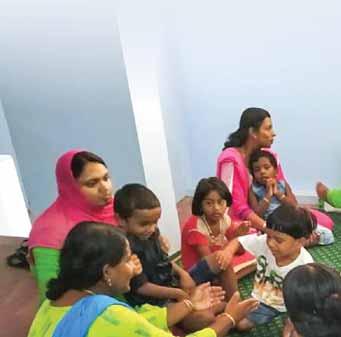
as A R Sulaiman Sait, the Municipal Chairman, K C Karunakaran, founder of the Alleppey Company manufacturing coir and Carnatic musician Parthasarathy Iyengar. Koder impressed upon them to form the first Rotary club in Alleppey and the charter was presented by the then DG Col Wignaraj from Colombo, to the charter president Sulaiman Sait.
In those days it was RID 56 comprising Kerala,
Sri Lanka and parts of Tamil Nadu. “A week after the charter presentation, the first bulletin was brought out as a typewritten sheet of paper; the club has so far published 3,700 bulletins, even winning the Best Bulletin award in 1980 from RC Moradabad, which had organised the contest.”
The club marked its silver jubilee with the construction of a community centre in 1974, named after PDG Revi Karunakaran,

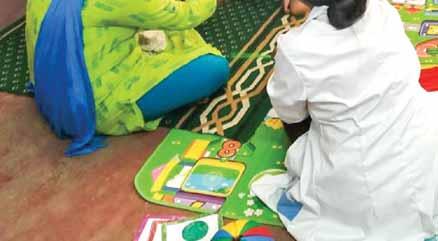


son of charter member Karunakaran. “PDG Revi became a Rotarian when he was 20 and at 24, was probably the youngest club president,” says Eapen, adding that he contributed generously to TRF as a benefactor. His wife Betty Karan is the first AKS member from the district and an active participant at all RI events. “She contributed liberally during the 2017 floods and Covid relief activities,” he says. The club has been addressed by luminaries such as C Rajagopalachari, former Presidents of India V V Giri and Neelam Sanjiva Reddy and educationist T M A Pai.
“One of our most significant service projects was executed in 1967 when Dr M C Modi, a pioneer in eye surgery and a Padmashri awardee, performed 512 cataract surgeries,” says Eapen.
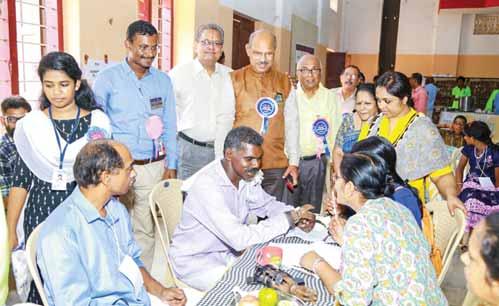
An LN-4 arm fitment camp in progress. PDG E K Luke (fourth from L) is seen watching a beneficiary.
Other noteworthy projects included adoption of a fishermen’s colony, and construction of a blood bank at the Women and Children Hospital in 1980 to commemorate Rotary’s 75th anniversary.
Vijayalakshmi Nair, the club’s first and only woman president, recalls
dedicating an ambulance to the community through a matching grant. The club has only three woman members now. With her husband Gopinathan Nair leading the club in 2011, “we made Alleppey Municipality cataract-free by conducting eye camps and surgeries in all 32
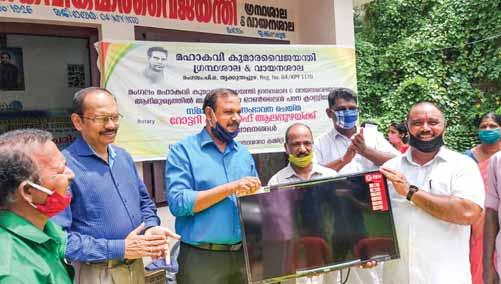
wards of the town,” she adds.
The more recent service activities include constructing houses in Kayalpuram village for people who lost their homes during the 2017 floods, besides providing rehabilitation support to the 1,500 families living there; an LN-4 arm fitment camp that benefitted 1,000 people; and distribution of soil-less grow bags for organic vegetable cultivation to the city residents. “To commemorate this landmark year we have set up a learningcum-physiotherapy centre for autistic children in our community centre and contributed ` 6 lakh to TRF this year,” says Cherian.
The 75-member-strong club is energised to execute more humanitarian projects in the coming years.
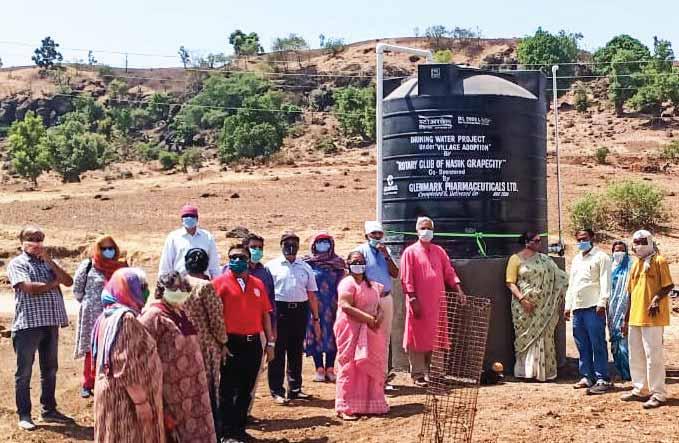
RIDistrict 3131 hosted an International Service and Peace Webinar focusing on conflict resolution that saw participation of 300 Rotarians from the US, Germany, Pakistan, Nepal, Sri Lanka, Bhutan, Maldives, New Zealand and India.
Addressing the virtual meet, PRID Bryn Styles, Chair of Rotary Peace Centres, Evanston, US, said the webinar has opened an opportunity to “examine our past concepts on peace and conflict resolution and ensure that we emerge from the pandemic stronger and more engaged.”

DG Ravee Dhotre welcomed the speakers and virtual delegates. In his keynote speech, PDG Krishnan Chittur from New York, US, turned the spotlight on the need to improve the capabilities of the youth through guidance and training.
The Rotary Peace Award, co-sponsored by RC Nigdi Pune, was given to Dr Bharat Kelkar from Nashik for providing medical services to those injured and affected in
the civil wars of Syria, Yemen and Mosul. The award for Overall Performance in International Service was given to RC Pune Shivajinagar. DG Dhotre released the ‘District International Service Avenue Report for 2019–20’.
Dr Pradeep Wagh, Director-International Service, RID 3131, moderated the webinar. The programme was live streamed through the Facebook page of RC Pune Shivajinagar reaching out to over 850 Rotarians from around the world.
Uday Nanda, a member of RAC Delhi Rajdhani, with the support of his club members, has designed a Chatbot to answer people’s questions about the

pandemic. A Chatbot is a software application that simulates online text conversation with individuals. You can ask questions and receive information similar to chatting with a real person. For health-related information, the App directs you to a related WHO page and for Rotary-related
query, it links you to the Rotary website. Travel guidelines, prevention tips, informative videos are also featured in the App.
“Based on the initial feedback, we are working on enhancing the user experience to allow the Chatbot to assist with booking doctor appointments, link the user to testing labs, and help locate food or supplies,” says Nanda.
The Chatbot can be accessed on the Rotaract Delhi Rajdhani club’s Facebook messenger page. For more details contact udaynanda.rotary@gmail.com
No child is a beggar or a garbage picker or a labourer here, says Divya Bartaria, President of RC Allahabad Midtown, RID 3120, referring to Gau Ghat, a slum near the Yamuna Bridge in Prayagraj. There are 200 children here and “every child is happy to attend a make shift school run by Vivek Kumar Dubey”, she says. She explains that Dubey hails from Barai Kala village in Jaunpur district. His childhood was spent in helping his mother who was working in a small farm. She died when
he was in Class 11, but her dream was he should pursue higher education. He completed BSc from Ewing Christian College, Allahabad, staying at the S D Jain Hostel and worked for his college fees by giving tuition. He then enrolled for MSc at the Allahabad University. While walking from the hostel to the University he would see children engaged in pasting posters, polishing shoes, showing snakes kept in a basket in return for money. One day, he came across two little girls picking garbage from the streets and bins
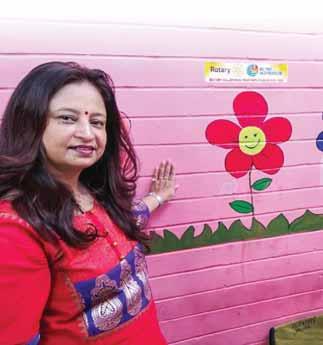

as they were hungry. He took them to a roadside restaurant and gave them food. Again here, he was disturbed to see young boys serving food. That’s when he and some of his friends, started a mission, Ek pahal shiksha ki aur (A step towards education) and formed a committee to provide education to the children of the Gau Ghat slums.
Divya continues: “Two years ago, impressed with his dedication and commitment, we decided to work with Dubey, although he shunned our help initially owing to some past unpleasant

experiences with some other NGOs.” The club members convinced him by explaining about Rotary’s literacy programmes and ever since, the club has been supporting Dubey’s mission by providing stationery items, footwear and new clothes for the children to sustain their interest in education.
“We conduct various contests for these children regularly and distribute prizes. We also keep the parents happy by gifting them new clothes, shawls and blankets for sending their children to school.”
The older children are given career guidance and a vocational training centre has been established in the locality by Dubey’s team to train women in tailoring. The club has equipped it with sewing machines, ceiling fans and furniture. Bicycles are being provided to girl children as an incentive to perform well in studies. The school is presently functioning in a makeshift shelter; so “we are exploring possibilities to provide a permanent structure for it,” says the club president, adding that she wants to support Dubey’s dream to
When we went there with brushes and paint cans, we were mobbed by the children and it was a fun exercise painting the walls together with them.
establish an orphanage on the outskirts of the town where he has a piece of land.
The mud walls of the thatched huts in the slum look vibrant, painted fluorescent yellow, green and pink, and decorated with hand-painted floral designs, birds and cartoon characters. “When we went there with brushes

and paint cans, we were mobbed by the children and it was a fun exercise with every resident pitching in one way or the other, transforming the place into a happy and creative environment,” she says.
More recently, a Rotary Sunday Bazaar was organised in Gau Ghat where household articles, clothes, bedsheets and footwear were lined up for sale. The local youth manned the stalls and the

items were sold for `5–10. “The money raised went to the development of the locality.”
Soon after the Covid-19 lockdown was announced, the Rotarians rushed to the slum to help the 300 families with essentials. They distributed cooked food and grocery kits to the residents, besides providing them with masks and sanitisers.
“We created awareness about corona virus and stressed the importance of maintaining hygiene and physical distance,” says Divya. As she steps into the new Rotary year, this feisty young president has plans to provide support to farmers by organising training in crop cultivation, use of advanced equipment and water management.


It’s
travel again, but this time with a twist in the telling (tailing, get it?!)
There’s a train journey in the book we’re looking at this time, a 15-hour trial by fire for a bunch of English singletons, travelling regular sleeper class express from Delhi to Mumbai, replete with the sights, sounds and smells of India unplugged with all the consequent turbidity. Now that’s a really long sentence, mainly because the word ‘turbid’ was trying desperately to nose its way into. If this explanation leaves you feeling further discombobulated, read on.
The book is The Lonely Hearts Travel Club: Destination India by Katy Colins, her second, after Destination Thailand. This time, we’re playing a game. The game is: there are words hidden in this article that are prominently displayed in Destination India; you could say that’s the Katy Colins signature. Your task is to ‘discover’ these words. How you will do this is left entirely to you: I can think of one way. But yes, ‘turbid’ is one of the words: it means confused, muddled. There are 35 more. By the way, I confess that some of these words shocked me into a realisation of my own nescience.

Anyway, so much for the game. Now, for the book. My eye does not miss any writing about India and if a book is to be seen, my hands automatically make a grab for it. That’s how this book landed up on my shelf, although the author is unknown to me and it seemed somewhat like chicklit, a genre I’m not too fond of. Having said that, there’s some outstanding chicklit out there, smart and easy to read.
character is Georgia Greene who, with a partner, runs a travel agency in Manchester (not London, for a change!) with a rather unique USP. It’s for those nursing a broken heart. They’re single, therefore sad, somewhat lonely, and basically unclubbable. The Lonely Hearts Travel Club arranges trips abroad to lift up their spirits. You could say the effort is to engage them in a journey of reparation, if that’s not being too fanciful. In the course of the story you find that the reason why this travel agency was founded was that Georgia herself needed to recover from a relationship that left her feeling wretched. She works so hard to make the agency work, it invidiously transforms her into a workaholic.


You could say this book is chicklit’s older cousin. The central

Recently, the agency’s India tours, though popular, have been receiving very poor reviews on online travel sites. A particularly scathing report threatens to scupper all that the team has been trying to achieve at the agency. Besides, Georgia’s social life is worse than worst. Her parents worry over her drawn looks; she is far from the ebullient creature she usually is. She is galvanised into taking a spontaneous decision to




travel incognito on the India tour as a hairdresser called Louise (she’s not lying, that’s her middle name) in order to check what’s ailing their tour guide, Nihal. Unmindful of the repercussions, she sets off on the tour without informing anyone at work, not even Ben, her partner whom she likes more than just a little.
And so, the small group arrives in New Delhi, meeting each other for the first time at the hotel and only just managing to spend a few minutes with Nihal. It doesn’t take much shillyshallying to figure out that Nihal is not all there: he appears tremulous, trepid, petulant even. Gradually Georgia figures out what the problem is even as she has to try really hard to keep her cover intact. The group goes through the usual touristy rigmarole, including gawping at the Taj Mahal, luxuriating on Goa’s beaches and confronting the Delhi Belly after succumbing indiscriminately to various culinary delectations. In the process, each character comes alive even as Georgia’s problems multiply. Of course, there are the usual bumps that writers unfamiliar with a territory, tend to trip over. Fatehpur Sikri is mistaken for Red Fort, the group celebrates




back at work. To make things worse, a temporary hand hired to help out in Georgia’s absence turns out to be a superwoman whose praises Ben simply cannot stop singing. No wonder Georgia is consumed by the green-eyed monster. The end takes you by surprise although the very end is predictable. Even so, considering that Destination Thailand and Destination India were inspired by Katy Colins’s actual travel solo across South East Asia, we can expect more travel fiction from her pen.
Holi in Goa (an odd choice), and is regularly served chai tea. Chai tea? Chai tea! However, these do not affect the flow of the story which is fast-paced. Besides, many of the observations, made lightly and in the context of the narrative, ring true, as, for instance a description of a toilet on the Agra leg of the tour; strangely this was an experience I had had several years ago on exactly the same sector, a trip to see the Taj!


In true Bollywood style, Nihal’s problem is solved on a movie set in Mumbai when a harassed film assistant ropes in this raggedy bunch as extras for a dance number. Movie aficionadas have seen this umpteen times in various films; for the visitors it is a taste of stardom, twinkling small but shiny! Truly, it’s Xanadu come live for these singletons who, after some major hiccups in the initial part of the tour, begin to loosen up and have a good time, thanks in large part to CEO Georgia Incognito. The denouement has Georgia facing the aftermath when her cover is blown by a dour-faced group member called Chris. She decides to flee the scene and return home, all the while suffering paroxysms of fear at the prospect of facing a firing squad
Many have written with candour and verisimilitude about India, among them Katherine Mayo whose Mother India Gandhiji dismissed as the report of a drain inspector, and V S Naipaul, whose An Area of Darkness has annoyed and continues to annoy many Indians. Of course, much of what they say unmasks the country and its people and this never leaves you feeling comfortable. Destination India is nothing like that: for one, it is fiction, light fiction; for another, it is affectionate even in the critical bits. Besides, it is always interesting and edifying to know how people view people — one set of people with their own baggage of experiences and expectations going up close and personal with a zillion other packages of experiences and expectations is a sure recipe for fireworks. Negotiating the unknown and the unfamiliar calls for valour and a willingness to cede your mind and heart to conflicting pushes and pulls in order to arrive at an accord. That’s what life’s all about, isn’t it? Sitting tight in the midst of differences and loving it all the same. In a small way, Destination India helps the reader sit tight. So then, sit tight and play the game.
The columnist is a children’s writer and senior journalist.

Source: RI South Asia Office
Covid-19 Response
As the Covid-19 pandemic spreads uncertainty and hardship worldover, Rotarians are caring for those affected, and showing that even at a distance, there are ways to help. They promote proper handwashing techniques, teach people to stay healthy, and provide
medical equipment and protective gear to healthcare providers.
The newly designed Rotary Youth Exchange Annual Report for the 2018–19 Rotary year is now available! Read a message from PRIP Barry Rassin, along with
Approved Covid Grants in India (as of June 5, 2020)
Grant typeGrantsTotal funding
GGs (new applications)82$5,925,957
GGs (repurposed funds)18$175,253
Disaster response grants37$919,981
inspiring stories and statistics about the programme on the RI website.
As part of RI’s alliance with Toastmasters, the first two courses in new leadership and communication series — Develop a speech and Deliver a speech are now available in the Learning Center at the RI website.
These courses, developed by Toastmasters International, include assignments to help put the new skills into practice and peer evaluations to
help growth through collaboration.
Effective April 1, 2020, donors have to provide PAN numbers for contributions made online/by cheque/draft, irrespective of value or the donor’s intention to claim tax exemption under Section 80G of the Income Tax Act, 1961. Tax exemption certificate u/s 80G of the Income Tax Act, 1961 will be issued to the remitter of the funds only subject to availability of PAN number.
Ten years ago Dr Ravindranath Tongaonkar, member of RC Dondaicha, RID 3060, and President of the Association of Rural Surgeons of India and International Federation of Rural Surgery pointed out that cysts
and keloids usually don’t cause pain unless they are inflamed or infected and usually disappear on their own and “that is the main reason why most of the rural and tribal people living in the region ignore it.” Since
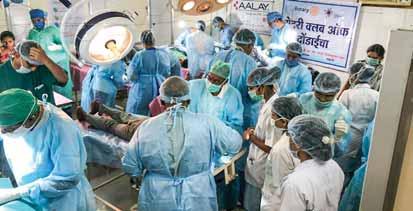
then the club has been organising an annual surgical camp to treat lipomas, sebaceous cysts, corns and keloids in the rural areas around Dondaicha in Dhule district, Maharashtra.
This year over 250 patients were examined at the Government Sub-District Hospital. A team of 15 surgeons and two anaesthesiologists performed surgeries on 175 patients. The camp was funded by club members and few other individuals; and Aalay Surgical Company gave `25,000 for the camp. PRIP Kalyan Banerjee visited the campsite and appreciated Club President Sanjay Nikam, Secretary Dr Nileshkumar Pawar and Project Chairman Dr Jain for the initiative.




RC Sonkatch, RID 3040, Madhya Pradesh, supplied PPE kits, medical equipment, essential supplies and masks to hospitals in Sonkatch and Dewas towns in Madhya Pradesh “so that doctors and paramedical staff there could work safely while treating Covid-19 patients. We are also making available masks and sanitisers to the public so that they can protect themselves from infection,” says PDG Dr Zamin Hussain, DRFC of RID 3040.
A global grant project for $45,000, the project is being done with support from RC Singapore, RID 3310, RC Dewas and TRF, he added. The project includes public awareness campaigns to educate people on safety norms so that the virus does not spread in their community. .

He explained that in mid-March as India started recording Covid-19 cases, nearby cities of Indore and Bhopal reported a steep rise in cases and there was apprehension that sooner or later, Dewas district would become a hotspot. The Rotarians of RC Sonkatch and Dewas decided to help the medical fraternity to cope with the situation. Deciding to apply for a global
To reciprocate RC Sonkatch, along with RC Khargone City, is supporting a Covid-19 GG project of RC Singapore.
grant, they roped in RC Singapore as the international partner. Dr Shahul Hameed from RC Singapore was in touch with Dr Hussain and the application for a GG was made. “It is remarkable that within 40 days, the project was designed, submitted, approved and the funds were received. Also, both the RI districts have also allocated their DDFs, besides cash contributions from clubs, for this project.”
Giving credit to Dr Hameed for raising funds for this project, he thanked members of RC Singapore for their generous contributions. DG Dhiran Datta launched this project on his official club visit, and District Magistrate Ankita Jain was present. He added that to reciprocate RC Sonkatch, along with RC Khargone City, is supporting a Covid-19 GG project of RC Singapore.
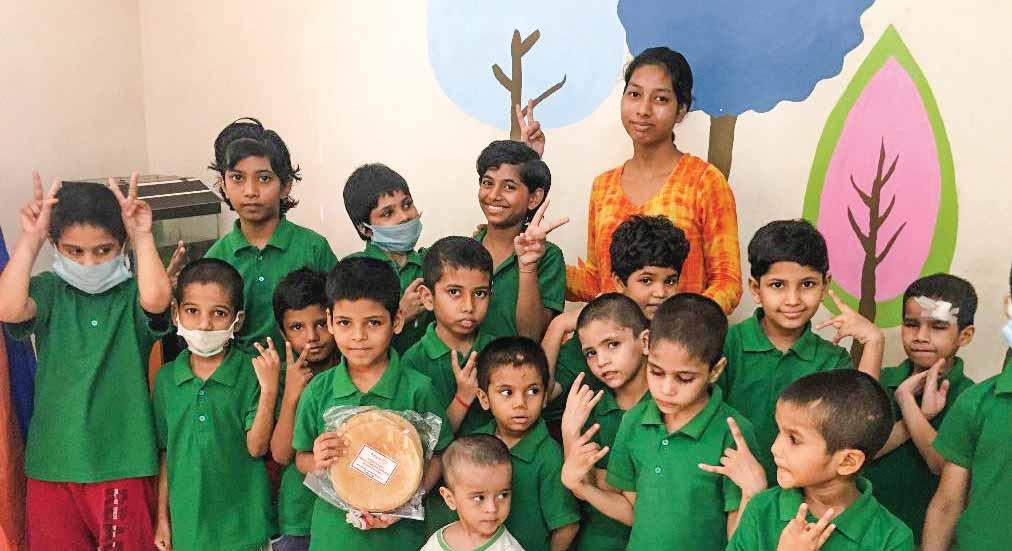
The Rotary Club of Surat, RID 3060, which has been active in Covidrelief work during the lockdown by distributing over 3,000 food packets a day to the needy, has also
provided masks, sanitisers, handwash stations, PPE kits and food grain kits, bringing smiles to the faces of the beneficiaries.
Now it has turned its attention to a staple of Gujaratis — khakhras.
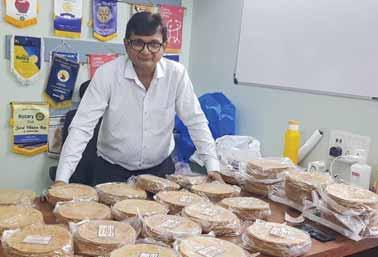
RC Surat President Nikhil Madrasi with packets of
.
“Khakhra is a very popular and healthy snack in Gujarat. It is mostly made at home by the housewives. Many a times it is the main source of family income, giving a woman about `400-500 a day,” says Mona Sitwala, club member.
Project khakhra was initiated through the social media by “sending out around over 3,000 messages across the city. The response was overwhelming with more than 200 women responding.”
Samples were sought, checked for quality, and
40 women were selected. The khakras made by these women are collected from them and delivered to clients. An ongoing project, by June first week, it had generated income for these 40 families, with more than 550 kg being sold. Past president Sarosh Bhacca sponsored the distribution of 50 kg of khakhras to various hospitals, old age homes and orphanages.
The club hopes to make this a permanent project, while expanding the list of items that the women can make and market.











Afew months ago
I was invited to judge a short movie competition for young students organised by the Rotaract Club of Nilgiris West and address the youngsters on mental health. Judging the competition proved to be tough; all the short movies were very interesting in their content and some were excellently made.
A common theme running through most of the short films was about youngsters experiencing depression on facing perceived failure or judgment from peers/family/society. It was clear that this was an
important and relevant area of interest or preoccupation with young people. In my talk I tried to focus on why the concept of failure needs to be rewritten and why it’s important to fail to learn life lessons.
Over the past few months, with the lockdown and anxiety surrounding Covid-19, a similar pattern seems to emerge. I was invited to a webinar on health-work-life balance organised by Pehla Sukh, India Wellness Initiative. We received over 800 questions prior to the webinar and almost every one of the shortlisted questions was related to stress, depression


and anxiety. The recent spate of suicides over the last month, (two of who I knew very well, were only in their thirties and early forties) leads me to think that there is a kind of collective societal anxiety that is unrelenting and mismanaged.
I am not a psychiatrist and would not attempt to treat or manage clinical depression, but I am fairly certain that many of us today will do very well with meaningful conversations, especially surrounding the meaning of success and failure. There seems to be a generalised angst regarding how we see ourselves in comparison with others and in the
context of what is expected of us from others in society. Why this pressure? Are we all not individuals in our own right capable of expressing ourselves in a way we see fit? Do we all need to adhere to society’s expectation of what is ‘normal’ in terms of success? What is the definition of success anyway?
A flush bank account? An enormous house? An ostentatious car? A high level job? The number of social media followers? Not that there is anything wrong with any of these aspirations and they can certainly be pursued if one so desires, but, there is no guarantee that any of it will bring happiness or lifetime satisfaction worth talking about.

Sheela Nambiar
A conversation about success, life satisfaction and meaning is the need of the hour. With the onslaught of social media ‘influencers’ talking about ‘making it big’, it is easy to fall prey to the idea that everyone needs to be ‘successful’ in the way defined by society. Parental pressure may be another reason young people feel less than ‘enough’ and succumb to the anxiety caused by driving too hard or expecting too much, even from themselves.

Having good social connections and at least a few authentic relationships matter in this regard. People who don’t judge you but support and accept you just the way you are matters. If you are fortunate, and have put in the effort and investment, (because authentic
relationships do require effort and investment), you will have few such people around you. In times of stress, these authentic relationships are very valuable.
More importantly, the ability to accept oneself even while trying to better oneself matters. Not allowing other people’s freely given advice, in the pretext of ‘in your best interest’ to adversely influence you is critical.
Stress and anxiety can lead to depression. While depression is very real and may require professional help in the form of psychotherapy, medication and CBT engaging with meaningful relationships and establishing a supportive environment goes a long way in mitigating stress.
Resilience is the ability to bounce back after a set-back. Since failure is a part of life and every one of us faces versions of failure throughout our lives we need to build resilience. Some people seem just more resilient than others. What are the common traits and practices of such people? ‘Mans search for meaning’ by Victor Frankle is worth reading to understand resilience.
Here are some things we can do to develop resilience – Dichotomy of control - Understand what you can and cannot control. Being able to identify what is within your control and trying to change it if required while at the same time letting go of things one has no control over is an important aspect that will serve us all well. In this Covid pandemic for instance, there’s not much we can do about the decisions taken by governments regarding lockdowns. There is however our ability to control our own behaviour by firstly not giving in to the contagion of fear, maintaining and improving our own immunity by eating healthy, exercising, managing stress and preventing infection
to the best of our ability. We can stay responsible for our own health and wellbeing even if we can’t control what is going on around us.
– There is a term in ancient Greek philosophy called Amor fati meaning ‘love your fate’. This attitude of taking on a challenge, accepting it as part of life and embracing it can be developed with practice.
– Surround yourself with authentic, supportive relationships. Social connectedness with the right people can be of great support especially in times of stress. Take the time and make the effort to maintain good relationships
– Practice self-care. Have a sound self-care practice. Set aside time to exercise, meditate; take the time to nourish yourself both physically and emotionally. Have a routine. We have to take care of ourselves first if we want to take care of others or withstand testing time.
– Develop self-awareness. Understanding oneself and one’s needs is important if we want to be fulfilled. Developing self-awareness is a journey. As we grow in this journey we understand ourselves better, let go of things or people that don’t serve us well, pay attention to what we truly need and discover what we need to do to achieve it. Sometimes, this journey may be uncomfortable as we discover things about ourselves we don’t like or understand. It’s worth the effort as it makes us more self-reliant and confident.
– Grow in self-confidence. All the above will help improve one’s self-confidence. When we lack self-confidence we are inevitably
drawn into societal/parental/peer pressure. We don’t serve our own needs but instead are in a constant state of unrest as we look for acceptance and validation in unlikely places. There’s nothing wrong with validation for your efforts. Sometimes it may not come in the time you expect it or from the people you expect it and that has to be accepted too.
– Stay focused. Stay focused on the best route to take to manage the stressful time. You may get plenty of advice on what to do and how to do it. Growing in self-confidence helps us make and stick with our own decisions after contemplating advice if necessary. Stay focused on your self-care, routine and growth. Stay focused on your internal radar.
– Reflect and redirect when necessary – even as we struggle with decisions or difficult times, we may need to change course along the way. We need to constantly reflect and redirect our efforts. This takes some level of self-awareness and humility. Accepting our own mistakes or poor judgment, getting help and course correcting is better than bullishly hanging on to an unsound resolution just because you started out with it.
Difficult times are a given. Riding the tide is a challenge but can be managed successfully if we stay mindful of some of the common practices to develop resilience. These will help us thrive instead of just survive.
The author is a lifestyle medicine physician. sheela.nambiar@gmail.com www.drsheelanambiar.com
Designed by N Krishnamurthy
You can pay the
online Our Bank details:
: HDFC Bank SB Account Branch : Montieth Road Egmore, Chennai
A/c Name : Rotary News Trust
A/c No. : 50100213133460
IFSC Code : HDFC0003820
E mail us following details: Name of Club
President/Secretary’s name Amount/Date of transfer/UTR Number
For physical payment by cheque or cash in bank, write Club Name only without prefixing “Rotary club of”. Eg. Rotary Club of Delhi Central should be written: Delhi Central.
Rotarians : 1,213,465
Clubs : 36,246
Districts : 525
Rotaractors : 175,735
Clubs : 10,602
Interactors : 340,377
Clubs : 14,799
RCC : 11,096
As on June 16, 2020
*Please note Interact clubs that have not reported Interact Adviser in the past two Rotary years, are placed in “Suspended” status effective Oct 1, 2019.


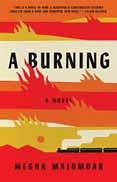
Author : Megha Majumdar
Publisher : Knopf Publishing Group
Pages : 304; `527
After a careless comment on Facebook, Jivan, a Muslim girl, is accused of a terrorist attack on a train and sent to jail. Her father’s rickshaw is crushed, and her home is ravaged. Staged in present-day Kolkata, the book is narrated by three characters: Jivan, Lovely, a transgender, with acting aspirations and PR Sir, her former gym teacher who is going out of his way to gain political clout. This thriller has communal divide, fate, corruption and justice as its central theme. It highlights through Jivan what it feels like to face obstacles and yet nurture big dreams in an environment of extremism. The novel touched upon income disparities, warped ideas of nationalism, biased media and sinister social media.
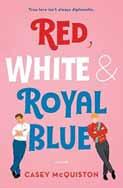
Author : Casey McQuiston
Publisher : St Martin’s Publishing Pages : 423; `499
Despitea royal wedding, turns out to be a PR disaster for both Alex Claremont Diaz, the son of the first woman President of America and Henry George Edward James Fox- Prince of England. Up for re-election, Alex’s mother strikes a fake friendship between the two handsome and charismatic men. The fake Instagram friendship soon turns into love and what follows is chaos. With the paparazzi behind them all the time, and an ocean in-between, their correspondence is restricted to emails. Both men realise they have a lot to risk and their relationship holds the power to derail the presidential campaign and cause havoc in two nations. Casey McQuiston speaks about a gay love story, cancel culture, twitter replies, and everything dear to the millennials in this book.

Author : Jodi Kantor and Megan Twohey
Publisher : Penguin Press
Pages : 310; `550
Inthis the Pulitzer Prizewinning book, the authors give an account of exposing the Harvey Weinstein scandal in the New York Times; this book talks about how assault and harassment are never really about sex, but about power. It uncovers assaults on women at all levels of the Hollywood industry and how as journalists they learned when to hold back and when to publish a story. A story, that could under the pressure of a producer, be washed down the drain and destroy the lives of the women who entrusted the two with their testimonies. Despite it being a difficult subject to talk about, the book has enough to be a thriller movie. Much more intimate than a report, this book shows respect towards the women involved and their decision to speak up or not while detailing the charges against Weinstein. A celebration of good journalism, this book is a reminder that the #metoo movement is just the beginning of a very long battle for Jodi and Megan.
Compiled by Kiran Zehra


The club donated `51,000 to Gurudwara Sri Guru Singh Sabha at Lajpat Nagar to provide meals for migrants. Besides, railway and bus tickets and meal packets were also given to migrants to help them reach their destinations comfortably.

The club, under the Covid-19 global grant, donated PPE kits, N95 masks, sanitisers, gloves, face shield masks and infrared thermometers to the medical staff at the Janseva Hospital and four primary health centres.
Spectacles are being given to those suffering from defective eyesight under the club’s Kannoli 1000 Project. The club has been conducting eye camps in villages and urban areas in a phased manner throughout this year.

Around500 patients were examined by doctors at a mega health camp organised in partnership with Amber Sky Network and Arogyam Medical. A 30 per cent subsidy was offered at the Arogyam Hospital for those in need of surgery.


Adisinfectant tunnel, sponsored by Rtn Anurag Mittal, was inaugurated by the DM Avinash Krishan Singh on the premises of the district magistrate office, Sambhal.

Aseminar-cum-medical camp was held under Project Positive Health: Stop NCD in which over 200 patients were screened for chronic ailments. DG Rajeev Garg was the chief guest at the seminar. PDG Prem Aggarwal thanked doctors from Max Hospital, Bathinda, for their service.

The club donated 1,800 litres of hand sanitisers to the UP Governor Anandiben Patel. The club name was printed on the bottles along with names of three research bodies, CSIR, IITR and CDRI, who have partnered in this initiative.
RC Ahmednagar
Priyadarshini
Four handwash stations were installed in government schools at a cost of `1 lakh, in the presence of DG Suhas Vaidya. This WinS project will benefit around 2,000 students.
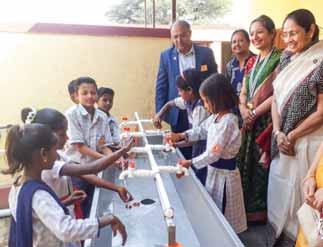
Amammography camp was held in Chembur to detect breast cancer among women. Four Rotarians took part as volunteers.


Tricycles and sewing machines were given to physically-challenged and needy women to help them earn a decent livelihood. Polio drops were given to newborns at a special camp and a rally was organised to create awareness on polio eradication by Rotary.
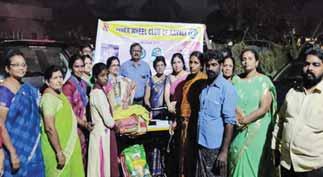
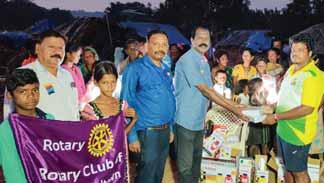
Solar lamps were donated to families in a slum colony. Children who were studying until then in streetlights, candle light and near the chulha (mud oven) were happy now as they could study without any hindrance with the help of solar lamps.
The club donated sewing machines to Sharadha Training Centre on the premises of the Ramakrishna Tapovana campus under its women’s empowerment programme.
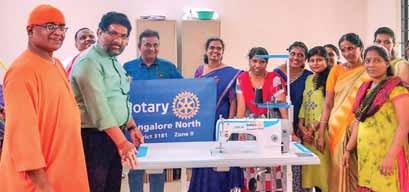
The club provided daily meals to 800 beneficiaries at the Erwadi Dargah in Ramanathapuram under the direction of PDG Dr Chinnadurai Abdullah. Charter President Dr N Karthikeyan, Club President Arun Prasad and Secretary Vijay Bhaskar mobilised funds through Kalam Vision India WhatsApp group.
seminar titled Sanjeevani was held in which PRID Y P Das, DG Dr Debashish Das and DGND Dr Kushanava Pabi participated. A colourful rally was taken with the participation of students to create awareness in the society.

RC Bhubaneswar
Capital
The club set up community kitchens in three localities to provide fresh, cooked food to migrants and needy people during lockdown. Several people benefitted from the initiative.


Club President Akhil Mishra was presented with Corona Warrior Award by District Collector Bharat Yadav and Social Justice Commissioner Ashish Dixit. The club distributed over 24,500 food packets, 400 PPE kits, masks and sanitisers during the lockdown.
Compiled by V Muthukumaran
Designed by L Gunasekaran

Would you like to contribute further to Rotary by serving on a committee? Each of Rotary’s committees, made up of Rotarians and Rotaractors from around the world, works with the organisation’s leadership to ensure efficiency and promote the goals and priorities laid out in the strategic plan. The following committees are searching for qualified candidates for limited openings in 2021–22. All committees correspond via email, teleconference, or webinars as needed, and some also involve at least one mandatory in-person meeting per year. Most committee business is conducted in English.
To be considered for committee membership or to recommend someone for an appointment, visit on.rotary.org/application2020.
Applicants must be registered on My Rotary at rotary. org/myrotary and should make sure their My Rotary profile includes current contact information.
Candidates may apply for only one committee.
The application deadline is Aug 15.
Audit
Advises the Board of Directors on financial reports, internal and external auditing, and the system of internal control
Communications Advises the Board on communication with key audiences
Independence, appropriate business experience, and demonstrated financial literacy in accounting, auditing, banking, insurance, investment, risk management, executive management or audit governance
Professional background and experience in a communicationsrelated field
One position for a six-year term; two meetings in Evanston per year and two teleconference / webinar meetings per year
Three positions for three-year terms; multiple conference calls; annual meeting in Evanston
Finance
Joint Committee on Partnerships
Advises the Board on Rotary’s finances, including budgets, investment policy, and sustainability measures
Advises the Board and The Rotary Foundation Trustees on partnership and sponsorship matters
Professional background in a finance-related field; nonprofit experience preferred. Candidates should have experience in financial matters at the club and district levels
Knowledge of Rotary grantmaking and international service portfolios; extensive experience in cultivating and developing partnerships with corporations, the NGO sector, and government; experience in cause marketing, sponsorship, and resourcegenerating relationships as well as international strategic partnerships; and clear understanding of the capacity and clubbased projects of Rotary
Two positions for three-year terms; two meetings per year in Evanston
Two positions for three-year terms; annual meeting in Evanston
Leadership Development and Training
Advises the Board on Rotary’s leadership training programme for Rotarians, clubs, and districts, with a special emphasis on training for district governors
Operations Review Monitors the effectiveness, efficiency, and implementation of operations and all internal systems; advises the Executive Committee on compensation matters; and performs other oversight functions as requested by the Board
Rotaract Advises the Board on Rotaract; develops the Rotaract Preconvention programme
Must have significant training or education experience with a preference for leadership development
Experience in management, leadership development, or financial management, and a thorough knowledge of Rotary’s operations. Appointments will be limited to past RI directors.
Rotarians: Experience working with Rotaract; direct experience as a mentor or Rotaract adviser or district chair. Rotaract alumni are strong candidates.
Rotaractors: Leadership at the club, district, or international level. Strong candidates who have served as a district Rotaract representative, organised projects, or attended a Rotaract Preconvention.
Two positions for three-year terms; annual meeting in Evanston
One position for a six-year term; two meetings per year in Evanston
Strategic Planning Reviews Rotary’s strategic plan and associated measures; advises leadership on other matters of longterm significance
10+ years of experience in strategy development, monitoring, and implementation, and strong understanding of RI and Foundation
Rotarians: One position for a three-year term; annual meeting in Evanston
Rotaractors: Three positions for one-year term; one meeting in Evanston
One position with a four-year term; two meetings per year in Evanston
Since everyone has been going on about working from home, here’s something personal. When I turned five in 1956 my parents decided I must go to school. Like any sensible child I saw no point in it. Indeed I hated it. The idea of being away from home for an activity that could be performed at home seemed ridiculous. But there was no recourse and for an excruciating 11 years, till 1967, I was forced to attend school. Then came happy deliverance. Somehow I managed to pass school and my parents sent me away to college. I had to attend only 66 per cent of the classes. That meant that for the rest of the time I could loaf about without a worry. After three years of this came more joy — the master’s degree where attendance was not compulsory. So I mostly stayed away from classes because, true to form since kindergarten, I could not follow anything that was said there. In fact, even the backbench wasn’t fun because all the girls sat in the front two rows. They took notes and I knew that with a little begging they would lend those notes to me. So those two years were blissful.
But all good things must end. Education ended and after a spell of unemployment that was mandatory in the 1970s, I found a job where 100 per cent attendance was compulsory, from 9 am to 5.30 pm. Within a week my soul was
in coma, not least because I was able to finish the day’s work by lunchtime. I somehow managed to last for five long years. Then one day a friend took pity on me and said I should try journalism. You can officially loaf about all day, go in at 6 pm, file your story by 7.30 and go off home then. This sounded heavenly and I became a journalist.
But after two weeks the editor decided to put me on morning duty, 10 am to 4 pm. My job was to ghostwrite editorials for him. I mastered the tricks quickly and by the end of three months I was done by noon and after handing in my work I would go back home. The bosses didn’t approve but there was nothing they could do. My wife liked it even less because the neighbours thought I was unemployed. Once the proprietor asked me what my career goal was. I told him it was to maximise leisure because the harder I worked the more money he made. That ended all prospects of advancement

but I didn’t care. I had hit the sweet spot of work-leisure balance.
Still, it irritated me that I had to go all the way to office in all kinds of weather to do what I could comfortably do at home in my shorts and T-shirt. But there was no way out until the day when a computer text transmission software called PC Plus came in 1996. The gates of heaven had opened up. A kindergarten dream had at last come true.
I mastered the tricks quickly, was done by noon and would return home. The bosses didn’t approve; my wife liked it even less because the neighbours thought I was unemployed.
I installed it in my computer and after being satisfied that it worked I went to the editor and said I would henceforth work from home. He demurred saying it would set a bad example to others. We argued for nearly six months. Then he said, ‘ok but I will reduce your salary by half’. He thought I would refuse but to his utter dismay I agreed. So since April 1997 I had worked from home. I sell my output, not my time. This means that as an early riser I work from 5.30 am to 9 am. After that I am free to do whatever I please. In 1998 I changed my tax status to self-employment which means I can claim expenses and reduce them from my taxable income. Also, because I sell my output there are many buyers now and I have been able to earn more than just a salary.
But the most important thing is that I go out only if I want to and not because I have to.
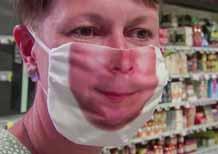
With masks becoming a part of daily wear, a Belgian businessman has given them a human face. He has developed a photo booth called Cheesebox that takes a shot of the lower face and prints it on a mask. The process takes a couple of minutes and produces an image that is friendlier and warmer. The masks come in double cotton layer and filter, and meets safety standards.

Mizoram’s Sports Minister Robert Royte turned labourer for two days to help a resident of his constituency rebuild his dilapidated house. Royte surprised the locals when he nonchalantly hoisted a boulder on his shoulder and walked up a slope to leave it at the construction site. “Everyone here looks up to me as a leader and it is important for a leader to lead by example,” he said.


In the Philippines, local officials dressed as Star Wars characters or in Darth Vader and Stormtrooper outfits catch public attention as they enforce strict quarantine measures and distribute relief packages. In the Java islands, volunteers clad as Superman, Spider Man, and Gatotkaca, a local superhero, appeal to people to wash their hands and wear masks, while handing out sanitisers.
After years of peddling warped messaging about the connection between beauty and fairness, following the furore in US and rest of the world and the trending of #BlackLivesMatter Unilever has finally changed the name of its product ‘Fair & Lovely” to ‘Glow & Lovely’. Words such as ‘fairness’, ‘whitening’ and ‘lightening’ may be removed from the advertising of its products. L’oreal has also announced a similar move.

Believe it or not but the ‘coronaburger’ does have takers at the Pizza Home takeaway shop at Hanoi. The bakery is selling 50 of these green tea stained burger buns with little ‘crowns’ resembling microscopic images of the Covid virus every day. ‘If you want to beat it, you’ve got to eat it first,’ says Chef Hoang Tung. In Helsenki, at the Ronttosrouva bakery, ‘toilet roll’ cakes made of oat batter, passion fruit mousse and covered with white fondant are a huge hit.
Regn. No. TN/CCN/360/2018-2020
Licensed to post WPP No.TN/PMG(CCR)/WPP-431/2018-2020
Total number of pages in this monthly issue, including cover, 84. Price: `35
Registered with Registrar of News Papers for India 3880/57 Rotary News Published on the first week of every month

It is time to renew your subscription of Rotary News or Rotary Samachar. Please pay your subscription dues promptly to ensure timely and uninterrupted receipt of your magazine.
Have you moved to another address? Update your address immediately with us so you get your magazine regularly. And make sure you mention the right PINCODE.
Presidents/Secretaries, please inform us immediately when you add a new member to your club or when someone leaves your club. Our Email id is rotarynews@rosaonline.org.
Please send your iconic projects in word file and pictures added separately (not embedded) to rotarynewsmagazine@gmail.com.

Payment – `420 per member for 12 months — can be made by cheque or draft favouring ‘Rotary News Trust’ and sent to us at Rotary News Trust, Dugar Towers, Third Floor, 34 Marshalls Road, Egmore, Chennai 600008.
Your magazine dues can also be transferred online at
Bank : HDFC Bank
Branch : Montieth Road, Egmore, Chennai
A/c Name : Rotary News Trust
A/c No. : 50100213133460 (SB Account)
IFSC Code : HDFC0003820
Name of Club
President/Secretary’s name and contact details
Amount/Date of transfer/UTR Number



For physical payment by cheque or cash in bank, write Club Name only without prefixing “Rotary club of”. Eg. Rotary Club of Delhi Central should be written: Delhi Central.
